常见的前缀
- 格式:doc
- 大小:459.50 KB
- 文档页数:17

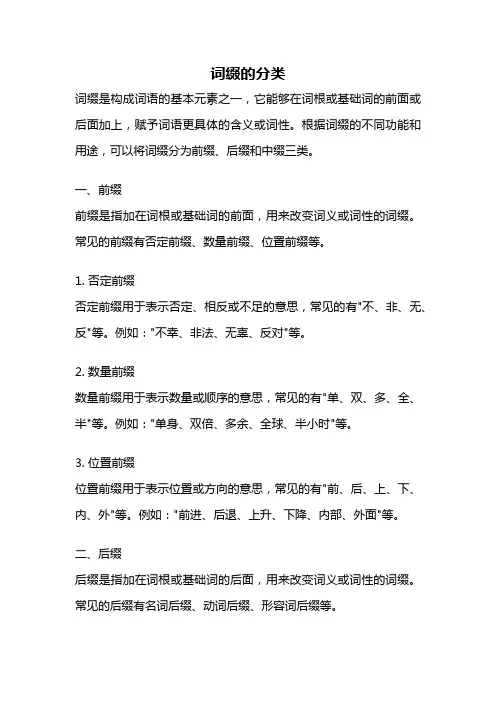
词缀的分类词缀是构成词语的基本元素之一,它能够在词根或基础词的前面或后面加上,赋予词语更具体的含义或词性。
根据词缀的不同功能和用途,可以将词缀分为前缀、后缀和中缀三类。
一、前缀前缀是指加在词根或基础词的前面,用来改变词义或词性的词缀。
常见的前缀有否定前缀、数量前缀、位置前缀等。
1. 否定前缀否定前缀用于表示否定、相反或不足的意思,常见的有"不、非、无、反"等。
例如:"不幸、非法、无辜、反对"等。
2. 数量前缀数量前缀用于表示数量或顺序的意思,常见的有"单、双、多、全、半"等。
例如:"单身、双倍、多余、全球、半小时"等。
3. 位置前缀位置前缀用于表示位置或方向的意思,常见的有"前、后、上、下、内、外"等。
例如:"前进、后退、上升、下降、内部、外面"等。
二、后缀后缀是指加在词根或基础词的后面,用来改变词义或词性的词缀。
常见的后缀有名词后缀、动词后缀、形容词后缀等。
1. 名词后缀名词后缀用于构成名词,常见的有"性、者、主义、化、度"等。
例如:"性别、读者、主义者、化学、宽度"等。
2. 动词后缀动词后缀用于构成动词,常见的有"化、使、动、重、翻"等。
例如:"化妆、使劲、动一动、重视、翻译"等。
3. 形容词后缀形容词后缀用于构成形容词,常见的有"的、性、化、厚、短"等。
例如:"美的、性感、化石、厚实、短暂"等。
三、中缀中缀是指加在词根或基础词的中间,用来改变词义或词性的词缀。
中缀在汉语中使用较少,常见的有"字、片、子"等。
1. 字中缀字中缀用于构成复合词,常见的有"一、二、三、上、下"等。
例如:"一字千金、二话不说、三心二意、上下一心"等。
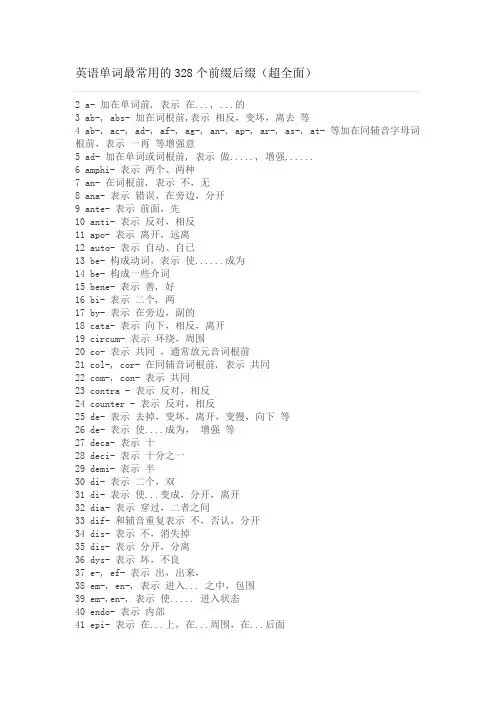
英语单词最常用的328个前缀后缀(超全面)2 a- 加在单词前, 表示在..., ...的3 ab-, abs- 加在词根前,表示相反,变坏,离去等4 ab-, ac-, ad-, af-, ag-, an-, ap-, ar-, as-, at- 等加在同辅音字母词根前,表示一再等增强意5 ad- 加在单词或词根前, 表示做....., 增强......6 amphi- 表示两个、两种7 an- 在词根前, 表示不,无8 ana- 表示错误,在旁边,分开9 ante- 表示前面,先10 anti- 表示反对,相反11 apo- 表示离开,远离12 auto- 表示自动、自已13 be- 构成动词,表示使......成为14 be- 构成一些介词15 bene- 表示善, 好16 bi- 表示二个, 两17 by- 表示在旁边,副的18 cata- 表示向下,相反,离开19 circum- 表示环绕,周围20 co- 表示共同,通常放元音词根前21 col-, cor- 在同辅音词根前, 表示共同22 com-, con- 表示共同23 contra - 表示反对,相反24 counter - 表示反对,相反25 de- 表示去掉,变坏,离开,变慢,向下等26 de- 表示使....成为,增强等27 deca- 表示十28 deci- 表示十分之一29 demi- 表示半30 di- 表示二个,双31 di- 表示使...变成,分开,离开32 dia- 表示穿过,二者之间33 dif- 和辅音重复表示不,否认,分开34 dis- 表示不,消失掉35 dis- 表示分开,分离36 dys- 表示坏,不良37 e-, ef- 表示出,出来,38 em-, en-, 表示进入... 之中,包围39 em-,en-, 表示使..... 进入状态40 endo- 表示内部41 epi- 表示在...上,在...周围,在...后面42 eu- 表示好,优秀43 ex- 表示出,出去44 ex- 表示前面的,前任的45 exo- 表示外部的,外面46 extra- 表示以外的,超过的47 fore- 表示前面,预先48 hecto- 表示百,很多49 hemi- 表示半50 hepta- 表示七51 hetero- 表示异类,异种52 hexa- 表示六53 holo- 表示全部'54 homo- 表示同类的55 hyper- 表示超过,太多56 hypo- 表示下面,次等57 il-, ir- 辅音重复表示不,无58 il-,ir- 表示使.....成为,进入59 im-, in- 表示不,无,非60 im-,in- 表示向内,进入61 inter- 表示在..... 之间,相互62 intra- 表示在内,内部63 intro- 表示向内,入内64 iso- 表示等, 同65 kilo- 表示一千66 macro- 表示宏传,大67 mal-; male 表示坏,恶68 meta- 表示超过, 改变69 micro- 表示微,小70 milli- 表示千,千分之一71 mini- 表示小72 mis- 表示错误,坏73 mono- 表示单个,一个74 multi- 表示多,很多75 neo- 表示新的76 non- 表示不,非77 ob- 表示逆,倒,增强意义78 octa- 表示八 ; 亦作octo79 omni- 表示全部,到处80 out- 示超过,过度81 out- 表示出去,过时82 over- 表示过度,过份83 over- 表示翻转84 over- 表示在... 之上85 paleo- 表示古,旧86 pan- 表示广泛的87 para- 表示半,类似,辅助88 para- 表示旁边89 para- 表示降落伞90 pen- 表示近似,差不多91 penta- 表示五92 per- 表示贯穿,自始至终93 per- 表示假,坏94 peri- 表示周围,靠近95 poly- 表示多96 post- 表示在后面97 post- 表示邮件,邮政98 pre- 表示 ...前的,预先99 pro- 表示赞同,亲...100 pro- 表示向前,在前101 pro- 表示很多...102 proto- 表示原始...103 pseudo- 表示假,伪104 quadri-,quadru- 表示四105 quasi- 表示类似,准106 re- 表示向后,相反107 re- 表示一再,重新108 retro- 表示向后,倒退109 se- 表示分开,离开,区别开110 semi- 表示半111 sept-,septi- 表示七112 sex-, sexi- 表示六113 step- 表示后,继或前夫(妻)所生114 stereo- 表示立体115 sub- 表示在下面,次一等,副手116 sub- 表示接近,靠近117 suc-, suf-, sup-, sur- 等辅音重复表示在...下面118 super- 表示在...上面119 super- 表示超级,超过,过度120 supra- 表示超...121 sur- 辅音不重复表示超过,在上面122 sus- 表示在... 下面123 sym-, syn- 表示共同,相同124 tetra- 表示四125 trans- 表示横过,越过126 trans- 表示变换,改变';转移127 tri- 表示三128 twi- 表示二、两129 ultra- 表示极端130 ultra- 表示超出,超过131 un- 表示不,无,非,没有132 un- 表示打开,解开,弄出133 under- 表示在...下,在...之内134 under- 表示缺乏,不够135 under- 表示副手 3136 uni- 表示一个、单一137 vice- 表示副138 with- 表示向后,相反140 -able 表形容词,可...的,能...141 -ably 表副词,能...地142 -aceous 表形容词,具有...特征的143 -acious 表形容词,有特征的,多...的144 -acity 表名词,有...倾向145 -acle 表名词, ... 物品,状态146 -acy 表名词, ...性质,状态147 -ad 表名词, ...东西,状态148 -ade 表名词, 表示状态,物品149 -ade 表示个人或集体150 -age 表示:费用151 -age 表示场所,物品152 -age 名词后缀,表示状态,总称153 -ain 表名词, ...人154 -air 表名词,人、物155 -aire 表名词, ...人156 -al 表形容词, ...的157 -al 表名词,人,物,状态158 -ality 表名词,状态,性质159 -ally 表副词,由al+ly 构成, ...地160 -an 表名词和形容词, ...地方,...人161 -ance 表名词,性质,状况162 -aneity 表名词,表示性质,状态163 -aneous 表形容词, ...有; ...特征的164 -ant 表形容词, ...的165 -ant 表名词, ...人166 -ant 表名词, ...剂167 -ar 表形容词, ...的168 -ard 表名词,不好的人169 -arian, 表形容词或名词, ...的(人)170 -arium 表名词,地点,场所171 -ary 表名词,人,场所,物172 -ary 表形容词, ...的173 -ast 表名词, ...人,物174 -aster 表名词,不怎么样的人175 -ate 表动词,做,造成176 -ate 表形容词,具有...的177 -ate 表名词,人或地位178 -atic 表形容词,有...性质的179 -ation 表名词,行为,过程,结果180 -ative 表形容词,有...倾向(性质)的181 -ator 表名词,通常由ate结尾的动词而来,做事的人或物182 -atory 表名词场所,地点183 -atory 表形容词,有...性质的184 -cy 表名词,也作-acy, 性质,状态185 -dom 表名词,状态或领域186 -ee 表名词,被动或主动的人187 -eer 表名词, ... 人员188 -el 表名词,人或物189 -en 表动词,变成190 -en 表形容词,由...制成的,通常加在名词后面191 -en 表名词,人或物192 -ence 表名词,性质,状态193 -ency 表名词,ence 的变体194 -enne 表名词,女性195 -ent 表形容词, ...的196 -ent 表名词, ...药剂197 -ent 表名词, ...人198 -eous 表形容词,有...的199 -er 表动词,反复做200 -er 表名词,物品,机器201 -er 表名词, ...人202 -ern 表形容词, ...方向的203 -ern 表名词, ...场所204 -ery 表名词,场所,地点205 -ery 表名词,行为,情况206 -esque 表形容词,如...的207 -ess 表名词,女性,雌性208 -et 表名词,小东西209 -etic 表形容词,属于...的210 -ette 表名词,小的东西或状态211 -ety 表名词,状态212 -eur 表名词, ...人213 -faction 表名词,达到的状态,由-fy转化而来214 -fic 表形容词,产生...的215 -fication 表名词,由fic变化而来216 -fier 表名词,人或物,由-ify转化而来217 -fold 表形容词或副词,倍,双重218 -form 表形容词,有...形状的219 -ful 表形容词, 有...的220 -ful 表名词, 满,量221 -fy 表动词, ...化,成为... ,更多时候作-ify222 -hood 表名词, 时期,性质等223 -ia 表名词, 某种病224 -ia 表名词, 总称,状态225 -ial 表形容词,有...的226 -ian 表名词,某种人227 -ian 表形容词, ...国家的228 -ibility 表名词,具备...性质的229 -ible 形容词能...的230 -ic 表形容词, ....的,有时作-tic231 -ic 表名词,某种药232 -ic 表名词,人或学科233 -ical 表形容词, ...的234 -ice 表名词,行为,状态235 -ics 表名词,学科,学术236 -id 表形容词,如...的237 -ie 表名词,小东西或人238 -ier 表名词,人或物239 -ile 表形容词, ...的240 -ile 表名词,物体241 -ine 表形容词, ...的242 -ine 表名词,人或女人243 -ine 表名词,状态, 药物等244 -ing 表形容词,正...的,令人...的245 -ing 表名词,行业246 -ing 表名词,物品247 -ing 表名词,状态248 -ion 表名词,动作或状态分为--sion和--tion两种249 -ion 表示某种物,用品250 -ior 表形容词,较...的251 -ious 表形容词, ....的252 -ise 表动词后缀,和-ize 相同,是-ize 的变体, ...化253 -ise 表名词,物品,状态254 -ish 表形容词,象...一样,有的... ,通常放在一具体名词后255 -ish 表动词,造成...256 -ish 表示国家的或语言257 -ism 表示学术或学术流派258 -ism 表示行为, 现象,状态259 -ism 表示疾病260 -ism 表示具备某种性质261 -ism 名词,表示各种主义,宗教262 -ist 表名词,表示信仰者,专家或从事人263 -ist 以-ist 结尾的单词,很多同时可做名词和形容词用。
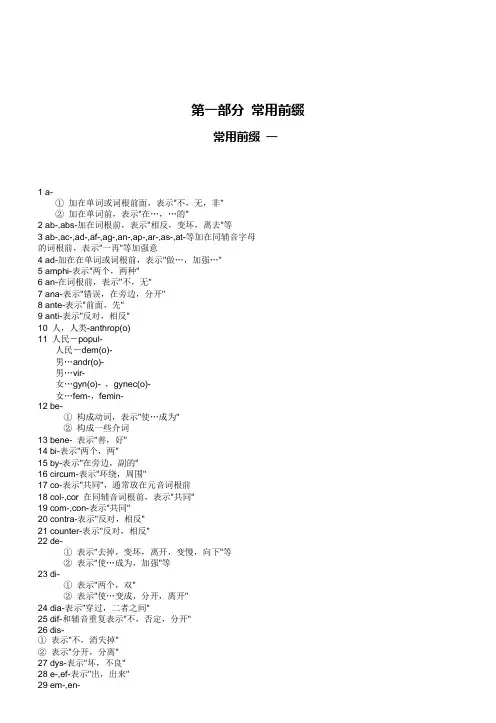
第一部分常用前缀常用前缀一1 a-①加在单词或词根前面,表示"不,无,非"②加在单词前,表示"在…,…的"2 ab-,abs-加在词根前,表示"相反,变坏,离去"等3 ab-,ac-,ad-,af-,ag-,an-,ap-,ar-,as-,at-等加在同辅音字母的词根前,表示"一再"等加强意4 ad-加在在单词或词根前,表示"做…,加强…"5 amphi-表示"两个,两种"6 an-在词根前,表示"不,无"7 ana-表示"错误,在旁边,分开"8 ante-表示"前面,先"9 anti-表示"反对,相反"10 人,人类-anthrop(o)11 人民―popul-人民-dem(o)-男…andr(o)-男…vir-女…gyn(o)- ,gynec(o)-女…fem-,femin-12 be-①构成动词,表示"使…成为"②构成一些介词13 bene- 表示"善,好"14 bi-表示"两个,两"15 by-表示"在旁边,副的"16 circum-表示"环绕,周围"17 co-表示"共同",通常放在元音词根前18 col-,cor 在同辅音词根前,表示"共同"19 com-,con-表示"共同"20 contra-表示"反对,相反"21 counter-表示"反对,相反"22 de-①表示"去掉,变坏,离开,变慢,向下"等②表示"使…成为,加强"等23 di-①表示"两个,双"②表示"使…变成,分开,离开"24 dia-表示"穿过,二者之间"25 dif-和辅音重复表示"不,否定,分开"26 dis-①表示"不,消失掉"②表示"分开,分离"27 dys-表示"坏,不良"28 e-,ef-表示"出,出来"29 em-,en-①表示"进入…之中,包围"②表示"使…进入状态"30 epi-表示"在…上,在…周围,在…后面"31 eu-表示"好,优秀"32 ex-①表示"出,出去"②表示"前面的,前任的"33 exo-表示"外部的,外面"34 extra-表示"以外的,超过的"35 fore-表示"前面,预先"36 hetero-表示―异类,异种‖37 homo-表示―同类的‖38 hyper-表示―超过,太多‖39 hypo-表示―下面,次等‖40 il-,ir-①放在同辅音词根前表示―不,无‖②表示―使…成为,进入‖41 im-,in-①表示―不,无,非‖②表示―向内,进入‖42 inter-表示―在…之间,相互‖43 intro-表示―向内,入内‖44 macro-表示―宏伟,大‖45 mal-表示―坏,恶‖(亦作male)46 micro-表示―微,小‖47 mini-表示―小‖48 mis-表示―错误,坏‖48 mis-表示―错误,坏‖49 mono-表示―单个,一个‖50 Multi-表示‖很多,很多‖51 neo-表示‖新的‖52 non-表示‖不,非‖53 omni-表示‖全部到处‖54 out-1①表示”超过过度”②表示”出去过时”55 over-①表示‖过度,过分‖②表示‖在……之上‖③表示―翻转‖56 paleo 表示:‖古,旧‖57 pan-表示―广泛的‖58 para-①表示―半,类似,辅助‖②表示―在旁边‖③表示―降落伞‖59 pen-表示―近似,差不多‖60 per-①表示―贯穿,自始至终‖②表示―假,坏‖61 peri-表示―周围,靠近‖62 poly-表示―多‖63 post-①表示―在后面‖②表示―邮件,邮政‖64 pre-表示―…前的,预先‖65 Pro-①表示―向前,在前‖②表示―很多…‖③表示―赞同,亲…‖67 paeudo-表示―假,伪‖68 re-①表示―向后,相反,不‖②表示―一再,重新‖69 retro-表示―向后,倒退‖70 se-表示―分开,离开,区别开‖71 sub-①表示―在下面,次一等,副手‖②表示―接近,靠近72 suc-, suf-, sup-, sur-等在同辅音词根前表示―在…下面‖73 sur-表示―超过,在上面‖74 super-①表示―超级,超过,过度‖②表示―在…上面‖75 sus-表示―在…下面‖76 sym-,syn-表示―共同,相同‖77 trans-①表示―横过,越过‖②表示―变换,改变,转移‖78 ultra-①表示―极端‖②表示―超出,超过‖79 un-①表示―不,无,非,没有‖②表示―打开,解开,弄出‖80 under-①表示―在…下‖②表示―不足,不够‖③表示―副手‖常用前缀二1 cata-表示―向下,相反,离开‖2 deca-表示―十‖3 deci-表示―十分之一‖4 demi-表示―半‖5 endo-表示―内部‖6 hecto-表示―百,许多‖7 hemi-表示―半‖8 hepta-表示―七‖9 hexa-表示―六‖10 holo-表示―全部‖11 intra-表示―在内,内部‖12 iso-表示―等,同‖13 kilo-表示―一千‖14 meta-表示―超过,改变‖15 milli-表示―千,千分之一‖16 ob-表示―逆,倒,加强意义‖17 octa-表示―八‖(亦作octo)18 penta-表示―五‖19 quadri-, quadru-表示―四‖20 quasi-表示―类似,准‖21 semi-表示―半‖22 sept,septi-表示―七‖23 sex-表示―六‖24 step-表示―后,继或前夫(妻)所生‖25 stereo-表示―立体‖26 supra-表示―超…‖27 tetra-表示―四‖28 tri-表示―三‖29 twi-表示―二,两‖30 uni-表示―一个,单一‖31 vice-表示―副‖32 with-表示―向后,相反‖2第二部分常用后缀1 -ability 表名词,―能…;性质‖2 -able 表形容词,―可…的,能…‖3 -ably 表副词,―能…地‖4 -aceous 表形容词,―具有…特征的‖5 -acious 表形容词,―有特征的,多…的‖6 -acity 表名词,―有…倾向‖7 -acle 表名词,―…物品,状态‖8 -acy 表名词,―→性质,状态‖9 -ad 表名词,―…东西,状态‖10 -ade 表名词①表示―状态,物品‖②表示―个人或集体‖11 -age名词后缀①表示―状态,总称‖②表示―场所,物品‖③表示―费用‖12 -ain 表名词,―…人‖13 -aire 表名词14 -al①表形容词,―…的‖②表名词,―人,物,状态‖15 -ality 表名词,―状态,性质‖16 -ally 表副词,由al+ly 构成,―…地‖17 -an 表名词和形容词,―…地方…人18 -ance 表名词,―性质,状况‖19 -ancy=ance,表示‖性质,状况‖20 -aneity,来自aneous,表名词,表示―性质,状态‖21 -aneors 表形容词,表示―…有;…特征的‖22 -ant①表形容词,―…的‖②表名词,―…人‖③表名词,―…剂‖23 -ar①表形容词,―…的‖②表名词,―人,物‖24 -ard 表名词,―不好的人‖25 -arian 表形容词或名词,―…的(人)‖26 -arium 表名词,―地点,场所‖27 -ary①表形容词,―…的‖②表名词,―人,场所,物‖28 -ast 表名词,―…人,物‖29 -aster 表名词,―不怎么样的人‖30 -ate①表动词,―做,造成‖②表形容词,―具有…的‖③表名词,―人或地位‖31 -atic 表形容词,―有…性质的‖32 -ation 表名词,―行为,过程,结果‖33 -arive 表形容词―有…倾向(性质)的‖34 -ator 表名词,通常由ate 结尾的动词而来,―做事的人或物35 -atory①表形容词,―有…性质的‖②表名词,―场所,地点‖36 -cy 表名词,也作-acy,―性质,状态‖37 -dom 表名词,―状态或领域‖38 -ee 表名词,―被动或主动的人‖39 -eer 表名词,‖…人员‖40 -el 表名词,―人或物‖41 -en①表动词,―变成‖②表形容词,―由…制成‖,通常加在名词后面③表名词,―人或物‖42 -ence 表名词,―性质,状态‖43 -ency,-iency 表名词,ence 的变体44 -enne 表名词,―女性‖45 -ent①表示形容词,―…的‖②表名词,―…药剂‖③表名词,―…人‖46 -eous 表形容词,―有…的‖47 -er①表名词,―…人‖②表名词,―物品,机器‖③表名词,―反复做‖48 -ern①表形容词,―…方向的‖②表名词,―…场所49 -ery①表名词,―场所,地点‖②表名词,―行为,情况‖50 -esque 表形容词,―如…的‖51 -ess 表名词,―女性,雌性‖352 -et 表名词,‖小东西―注:-let=-et 表示―小‖53 -etic 表形容词,―属于…的‖54 -ette 表名词,―小的东西或状态‖55 -ety 表名词,―状态‖57 -faction 表名词,―达到的状态‖,由-fy 转化而来58 -fold 表形容词或副词,―倍,双重‖59 -form 表形容词,―有…形状的‖60 -ful①表形容词,―有…的②表名词,―满,量‖61 -hood 表名词,―时期,性质等‖62 -ia①表名词,―某种病‖②表名词,―总称,状态‖63 -ial 表形容词,―有…的‖64 -ian①表名词,―某种人‖②表形容词,―…国家的‖65 -ibility 表名词,―具备…性质的‖66 -ible 形容词―能…的‖67 -ic①表形容词,―…的‖②表名词,―人或学科‖③表名词,―某种病‖68 -ical 表形容词,―…的‖69 -ice 表名词,―行为,状态‖70 -ics 表名词,―学科,学术‖71 -id 表形容词,―如…的‖72 -ie 表名词,―小东西或人‖73 -ier 表名词,―人或物‖74 -ific 表形容词,―产生…的‖75 -ification 表名词,由ific 变化而来76 -fier 表名词,―人和物‖,由-ify 转化而来78 -ile①表形容词,―…的‖②表名词,―物体‖79 -ine①表形容词,―…的‖②表名词,―人或女人‖③表名词,―状态,药物等‖80 -ing①表名词,―状态‖②表名词,―行业‖③表形容词,―正…的‖,―令人…的‖81 -ion①表名词,―动作或状态‖②表示―某种物,用品‖82 -ior 表形容词,―较…的‖83 -ious 表形容词,―…的‖84 -ise①表动词后缀,和-ize 相同,是-ize 的变体,―…化‖②表名词,―物品,状态‖85 -ish n①表形容词,―像…一样,有的…‖,通常放在一具体名词后②表动词,―造成…‖③表示―国家的或语言‖86 -ism 名词①表示―各种主义,宗教‖②表示―学术或学术流派‖③表示―行为,现象,状态‖④表示―疾病‖⑤表示―具备某种牲质‖87 -ist 表名词,―表示信仰者,专家或从事某活动的人‖88 -istic 表形容词,由-ist+ic 构成,表示―…的‖89 -it①表名词,通常是抽象名词②表名词,―…的‖90 -ite①表形容词,―…的‖②表名词,―人或物‖③表动词,―促成‖91 -iteon 表名词,―行为过程,状态‖92 -itious 表形容词,-ition 变化而来,表示―…的‖93 -itive 表形容词,―…的‖94 -itor 表名词,―人‖95 -itude 表名词,―性质,状态等‖96 -ity 表名词,指具备某种性质97 -ive①表形容词②表名词后缀,―人或物‖98 -ivity 表名词,由-ive+ity 组成,―有…能力或特性‖99 -ixation 表名词,来自-ize+ation,―…化‖或―发展过程‖100 -kin 表名词,―小…‖101 -less 表形容词,""无…的,不…的‖4 5102 -like 表形容词,―像…一样‖103 -ling 表名词,―小东西或某种人‖104 -ly①表形容词,通常加在名词后②表副词,通常放在形容词后105 -ment①表名词,―行为或结果‖②表示具体物106 -most 表形容词,―最…的‖107 -ness 表名词,―性质,状态,‖通常加在形容词后面108 -o①表名词,―人,物或状态‖②表名词,用于音乐术语109 -on 表名词,指人,物和一些物理学上的名词110 -oon 表名词,―人或物‖111 -or 表名词,―人或物器‖,在一些词根前写成―-ator‖112 -ory①表形容词,―…的‖②表名词,指场所等113 -ose 表形容词,―多…的‖114 -osity 表名词,ose+ity 组成,表示―多…的状态‖115 -ot 表名词,―…人‖116 -ous 表形容词,通常放在一个完整的单词后,表示―…的‖117 -proof 表形容词,―防…的‖118 -ress①表名词,指―女性‖②表名词,指―物品‖119 -ry 表名词,通常放在一个完整的单词后面①表示―状态,性质‖②表示―行业,学科‖③表示集合名词④表示―场地‖120 -ship①表示某种关系或状态②表示某种技能121 -some 表形容词,―充满…的,具有…倾向的‖122 -ster 表名词,―…人‖123 -th 表名词,通常指抽象名词124 -tic 表形容词,通常放在一个名词前,―与…相关的,…的‖125 -ture 表名词,通常在单词或词根以t 结尾时使用,表示―一般状态,行为‖…ature―,―iture‖注:-ture 在s 结尾的词根后变成-sure,如:126 –ty 表名词,用在形容词后,把形容词变成名词127 -ular 表形容词,―有…形状或性质的‖128 -ule 表名词,―小…‖129 -uous 表形容词,―多…的‖130 -ward 表形容词+副词,―向…‖131 -wise 表副词,―方向,状态‖132 -y①表形容词,加在名词后变成形容词②表名词,加在形容词或以r 结尾的单词后③表名词,―人或小东西‖常带有戏谑性和爱称第三部分常用词根常用词根一1 acid, acri, acrid, acu=sour, sharp, 表示―尖,酸,锐利‖2 act=to do , to drive,表示―行动,做‖3 aer, aero, aeri=air,表示―空气,充气‖等4 ag=do, act, 表示―做,代理做‖5 agri, agro, agr=field, land, 表示―田地,农业‖等6 alter, altern, ali=other, to change, 表示―其他的,改变状态‖7 am, amor, amat=love,表示―爱,情爱‖8 ambul=walk,表示―行走,走路‖9 anim=life,spirit, 表示―生命,精神‖等10 ann, enn=year,表示―年,一年‖11 anthrop=man,human,表示―人,人类‖12 opt,ept=fit, ability,表示―适应,能力‖13 aqu=water,表示―水‖14 arch, archy=ruler, rule, chief, 表示―统治者,统治,主要的‖15 art=skill, joint, trick, 表示―技巧,关节,诡计‖16 astro,aster=star,表示―星星‖17 audi,audit=hear,表示―听‖18 av,avar, avi=desire,bird,表示―渴望,鸟‖19 ball,bol=throw, dance, ball,表示―抛,舞,球‖20 bas,base=low, foundation,表示―低下,基础‖21 bell,bel=war, fight,表示―战争,打斗‖22 bio,bi=life,表示―生命,生物‖23 brev, bridg=short,表示―短,缩短‖24 cad, cas, cid=fall,表示―落下,降临‖25 cand=white,glow,表示―白,发光‖25 cand=white,glow,表示―白,发光‖26 cant,cent=sing,song,表示―唱,歌‖27 cap, capt, cept ,ceive, cip, cup=take, hold, seize, 表示―拿,抓,握住‖28 cap, cipit=head,表示―头‖29 card, cord=heart,表示―心脏,一致‖30 carn=flesh,表示―肉,肉欲‖31 ced, ceed, cess=go,表示―行走,前进‖32 celer=quick,speed,表示―快,速‖33 cent=hundred,表示―一百‖34 centr=center,表示―中心‖35 cern, cert, cret=sure, separate,表示―搞清,区别‖36 chron=time,表示―时间‖37 cid,cis=cut,kill,表示―切开,杀‖38 circ,cycl=ring,circle,表示―圆,环‖39 cit=quote,call, 表示―引用,唤起‖40 claim, clam=cyrout, shout,表示―呼喊,叫喊‖41 clear, clar, clair=clear, bright,表示―清楚,明白‖42 clin, cliv=lean,slope,表示―倾斜,斜坡‖43 clos, clud, clus=close,表示―关闭‖44 corp,corpor=body,表示―身体,团体‖45 cracy=rule,表示―统治或政体‖;crat=ruler,表示―统治者‖46 creed,cred=believe,trust,表示―相信,信任‖47 cre,creas=grow,make,表示―增长,产生‖48 cruc,crus,crux=cross,表示―十字形,交叉‖49 crypt=secret,hidden,表示―秘密,隐藏‖50 cub,cumb=lie down,表示―躺‖;cumber=barrier,表示―躺的东西,障碍‖51 cult=till,表示―耕种,培养‖52 cur=care,表示―关心‖53 cur(r),curs, cours=run , 表示―跑,发生‖54 dem(o)=people,表示―人民,人们‖55 dent=tooth,表示―牙齿‖56 derm,dermat =skin,表示―皮肤‖57 dict,dic=say,assert, 表示―说话,断言‖58 dign=worthy,noble,表示―值得,高贵‖59 doc,doct=to teach, 表示―教‖60 don,dit=give,表示―给予‖61 du,dub,doub=two,表示―二,双‖62 duc,duct=lead,bring,表示―引导,带来‖63 dur=last,hard,表示―持久,坚硬‖64 dyn,dynam=power,表示―力量‖65 em,empt,ampl=take,procure,表示―拿,获得‖66 equ,equi=equal,even,表示―相等,平均‖67 erg=energy,work,表示―能量,活动‖68 err=wander,mistake,表示―漫游,犯错误‖69 ev=age,表示―年龄,时代‖70 fabl,fabul=speak,表示―讲,说‖71 fac,fic=face,表示―脸,面‖72 fac,fact,fect,fic,fig=make,do,表示―做,制作‖73 fall,fail,fault=err,deceive,表示―犯错误,欺骗‖74 fer=bring,carry,表示―带来,拿来‖75 ferv=boil,表示―沸,热‖76 fid=trust,faith,表示―相信,信念‖77 fin=end,boundary,表示―结束,范围‖78 flam,flagr=blaze,表示―火焰‖79 flect,flex=bend,表示―弯曲‖80 flict=strike,表示―打击‖81 flor,flour=flower,表示―花‖82 flu=flow,表示―流动‖83 fore,fort=storng,表示―强大,力量‖84 form=shape,表示―形状‖85 fract,frang=break,表示―打碎‖86 frig,friger=cold,表示―冷‖87 fug=flee,表示―逃,离开‖88 fus=pour,表示―流,泻‖89 gen,gener,genit=birth,produce,表示―出生,产生‖90 gest,gister=carry,bring,表示―带来,产生‖91 gnos(t),gnor=know,表示―知道‖92 gon=angle,表示―角‖93 grad=step,grade,表示―步,级‖94 graph,gram=write,表示―写,图‖95 grat,gree=pleasing,表示―感激,高兴‖96 grav,griev=heavy,表示―重"97 greg=group,表示―群体‖698 gress= go,walk,表示―行走‖99 gyn,gynec=woman,表示―妇女‖100 habit=dwell,表示―居住‖101 hap=chance,表示―机会,运气‖102 her,hes=stick,表示―粘附‖103 hibit=hold,表示―拿住‖104 hum=earth,表示―土,地‖105 hydy,hydro= water,表示―水‖106 idea,ideo=idea,表示―思想,观点‖107 it=go,表示―行走‖108 ject=throw,cast,表示―投掷,扔‖109 judg,judic=judge,表示―判断‖110 junct,join=join,表示―结合,连接‖111 jur,juris=swear,law,表示―发誓,法律‖112 juven=young,表示―年轻‖113 labor=labor,表示―劳动‖114 laps=slip,表示―滑,滑走‖115 lat= bring,out,表示―拿出,带出‖116 lav,luv,lut=wash,表示―洗,冲洗‖117 lect,lig= choose,gather 表示―选择,收集‖118 lect,leg=speak,read,表示―讲,读‖119 leg,legis=law,表示―法律‖120 lev,live=raise,lighten,表示―提高,举起,变轻‖121 liber=free,表示―自由‖122 limin,lim=threshold,表示―门槛,限制123 line=line,表示―直线,线条‖124 Lingu=language ,表示―语言‖,原意为―舌头‖125 Liter=letter,表示―文字,字母‖126 lith=stone,表示―石头‖127 loc=place,表示―地方‖128 Log,logu=speak,表示―说话‖129 log=science,表示―科学,学科‖130 Long=leng,表示―长‖131 loqu,locu=speak,表示―说话‖132 luc,lust=light,shine,表示―光,照亮133 lumin=light,表示―光‖134 lud,lus=play,表示―玩,戏剧‖135 man, maun= hand,表示―手‖136 Marin=sea,表示―海洋‖137 mark= sign ,表示―记号,符号‖138 matern, matr= mother, 表示―母性,母亲‖139 med=middle,表示―中间140 memor=memory,表示―记忆‖141 ment= mind,表示―思考,神智‖142 merg, mers= sink,表示―沉,没‖143 meter,metr,meas,mens=measure,表示―计量,测量等‖144 migr=remove,表示―迁移145 min=project,表示―伸出,突出‖146 mini,min=small,表示―小‖147 mir =wonder,look,表示―惊奇,看‖148 Misc=mix,表示―混淆‖149 Miss,mit= send,cast,表示―送,放出‖150 Mob=move,表示―动‖151 mod=mode,manner,表示―方式,模式,风度‖152 mon, monit= warn,表示―警告‖153 morph=form,shape,表示―形状‖154 mort=death,表示―死‖156 mount=ascend,表示―登上‖157 Muni,mun= public,表示―公共的‖158 mut= change,表示―改变‖159 Nat=born,表示―出生的‖160 Nav,naus, naut= ship, 表示―船‖,naut 引申为―海员‖161 Nect,nex= bind, 表示―连结‖162 neg=deny, 表示―否认‖163 Negr, nigr= black,表示―黑‖164 Noc, nox= hurt, poison, 表示―伤害,毒‖165 nom(y)=a field of knowledge, 表示―某一领域的知识‖166 nomin=name,表示―名称,名字‖167 norm=rule, norm,表示―规则,规范‖168 Not=know,表示―知道,注意‖169 nounce,nunci= speak,表示―讲话,说出‖170 Nov=new,表示―新的‖171 Numer=number,表示―数目‖172 Onym=nam, 表示―名字‖173 Oper=work ,表示―工作‖174 Opt= choose,表示―选择‖175 Opt,opto= sight,表示―视力‖176 Ora,orat=mouth, 表示―嘴,说‖177 Ori,orig= rise, begin ,表示―升起,开始‖178 Ordin=order,表示―命令,顺序‖179 Orn=embellish,表示―装饰‖180 par=equal,表示―平等‖181 Part, port=part, divide,表示―部分,分开‖182 Pass=pass through,表示―通过‖183 Pass= felling, 表示―感情‖184 path=feeling, suffering, illness,表示―感情,7141 ment= mind,表示―思考,神智‖142 merg, mers= sink,表示―沉,没‖143 meter,metr,meas,mens=measure,表示―计量,测量等‖144 migr=remove,表示―迁移145 min=project,表示―伸出,突出‖146 mini,min=small,表示―小‖147 mir =wonder,look,表示―惊奇,看‖148 Misc=mix,表示―混淆‖149 Miss,mit= send,cast,表示―送,放出‖150 Mob=move,表示―动‖151 mod=mode,manner,表示―方式,模式,风度‖152 mon, monit= warn,表示―警告‖153 morph=form,shape,表示―形状‖154 mort=death,表示―死‖156 mount=ascend,表示―登上‖157 Muni,mun= public,表示―公共的‖158 mut= change,表示―改变‖159 Nat=born,表示―出生的‖160 Nav,naus, naut= ship, 表示―船‖,naut 引申为―海员‖161 Nect,nex= bind, 表示―连结‖162 neg=deny, 表示―否认‖163 Negr, nigr= black,表示―黑‖164 Noc, nox= hurt, poison, 表示―伤害,毒‖165 nom(y)=a field of knowledge, 表示―某一领域的知识‖166 nomin=name,表示―名称,名字‖167 norm=rule, norm,表示―规则,规范‖168 Not=know,表示―知道,注意‖169 nounce,nunci= speak,表示―讲话,说出‖170 Nov=new,表示―新的‖171 Numer=number,表示―数目‖172 Onym=nam, 表示―名字‖173 Oper=work ,表示―工作‖174 Opt= choose,表示―选择‖175 Opt,opto= sight,表示―视力‖176 Ora,orat=mouth, 表示―嘴,说‖177 Ori,orig= rise, begin ,表示―升起,开始‖178 Ordin=order,表示―命令,顺序‖179 Orn=embellish,表示―装饰‖180 par=equal,表示―平等‖181 Part, port=part, divide,表示―部分,分开‖182 Pass=pass through,表示―通过‖183 Pass= felling, 表示―感情‖184 path=feeling, suffering, illness,表示―感情,7痛苦,病‖185 Patr(I)=father,表示―父亲‖186 Ped=foot, 表示―脚‖187 ped=child, education,表示―儿童‖,引申为―教育‖188 Pel,puls= drive, push, 表示―驱动,推‖189 Pen,pun=penalty,表示―处罚‖190 Pend, pens= hang, 表示―悬挂‖191 Pend,pens, pond= weight, expend, 表示―称重量,称银子‖,引申为―花费‖192 per=try,表示―尝试‖193 pet=seek,表示―追寻,寻求‖194 phag=eat,表示―吃‖195 phil,philo=love,表示―爱‖196 Phob,phobia=dislike,表示―厌恶‖197 phon=sound,表示―声音‖198 Pict=paint,表示―描画‖199 plac=to please,表示―取悦,使满意,使平静‖200 plat= flat,表示―平坦‖201 Plant=plant,表示―种植‖202 Ple,plen,plet, pli=full, fill,表示―满,填满‖203 plex= fold,表示―重叠‖204 plic, pli, ply= fold ,表示―重叠,折叠‖205 plor=cry,weep, 表示―喊,哭‖206 point,punct= point,make sharp, 表示―点,变尖‖208 pon, pound= put, 表示―放置‖209 Popul,publ=people,表示―人民‖210 Port=carry,表示―拿,运‖211 Pos, posit=put, 表示―放‖212 Prais, preci= value, 表示―价值‖213 Prehens, prehend= catch ,表示―抓住‖214 Press= press, 表示―挤压‖215 Prim= first, chief, 表示―第一,主要的‖216 Pris= take, 表示―拿住,抓住‖217 Priv=single, alone, 表示―单个‖218 Prob, prov= test, 表示―测试,证明‖219 Proper, propri = one's own, 表示―拥有‖,引申为―恰当的‖220 Pugn=fight,表示―打斗‖221 Pur, purg=pure, 表示―纯洁‖222 put =think, 表示―认为,思考‖223 Quest,quir, quis, quer= seek, search, 表示―寻求,询问‖224 Quiet, qui= still, 表示―静‖225 Quit= free, 表示―自由‖226 Radic= root,表示―根‖227 Range=rank,表示―排列,顺序‖228 Rap,rapt,rav=snatch,表示―捕,夺229 Ras, rad=scrape,表示―刮擦‖230 rect=stright, right, 表示―正,直‖231 Rid, ris= laugh,表示―笑‖232 Rod, ros= bite, 表示―咬‖233 Rog=ask, 表示―要求,问‖234 Rot= wheel, 表示―轮子,转‖235 Rud= rude, 表示―原始,粗野‖236 rupt=break, 表示―断裂‖237 Sal= salt,表示―盐‖238 San, sanit= healthy,表示―健康的‖239 Sanguin= blood ,表示―血‖240 sati,satis,satur=enough,full of food, 表示―足够,饱足‖241 scend, scens, scent=climb,表示―爬,攀‖242 sci=know, 表示―知道‖243 scrib,script=write,表示―写‖244 Secut,sequ= follow,表示―跟随‖245 Sect,seg= cut, divide, 表示―切,割‖246 Sens, sent =feel, 表示―感觉‖247 Sen=old,表示―老‖248 Sert=join, insert,表示―加入,插入‖249 Serv=serve, keep ,表示―服务,保持‖250 Sid=sit,表示―坐‖251 Sign=mark,表示―记号,信号‖252 Simil, simul, sembl =alike,same ,表示―相类似,一样‖253 Sinu=bend,表示―弯曲‖254 Sist= stand, 表示―站立‖255 Soc=companion,表示―同伴‖,引申为―社会‖256 Sol=alone,表示―单独‖257 Sol=sun ,表示―太阳‖258 Solv,solu, solut=loosen,表示―松开‖259 Somn=sleep,表示―睡眠‖260 son=sound,表示―声音‖261 Soph=wise,表示―智慧,聪明‖262 speci=look, kind, 表示―外观,种类‖263 Spect, spic= look, see,表示―看‖264 Sper=hope, 表示―希望‖8 9265 Spers= scatter,表示―散开‖266 Spir=breathe,表示―呼吸‖267 Spond, spons =promise,表示―承诺‖268 St, sta, stat, stan, stant, stin = stand, 表示―站,立‖269 Stell=star,表示―星星‖270 satill=small drop。
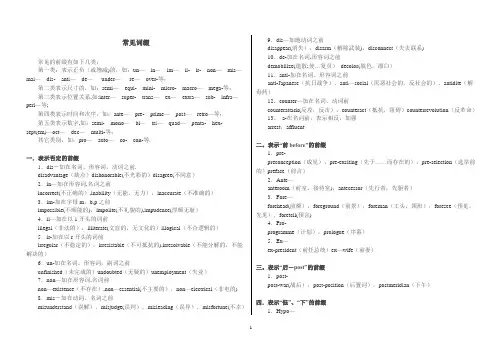
常见词缀常见的前缀有如下几类:第一类:表示正负(或增减)的,如:un—in—im—il- ir- non—mis—mal—dis- anti—de—under—re—over-等;第二类表示尺寸的,如:semi—equi- mini- micro- macro—mega-等;第三类表示位置关系,如:inter—super- trans—ex—extra—sub- infra—peri—等;第四类表示时间和次序,如:ante—pre- prime—post—retro—等;第五类表示数字,如:semi- mono—bi—tri—quad—penta- hex-sept(em)—oct—dec—multi-等;其它类别,如:pro—auto—co- con-等.一.表示否定的前缀1.dis-加在名词、形容词,动词之前.disadvantage(缺点)dishonorable(不光彩的)disagree(不同意)2.in—加在形容词,名词之前incorrect(不正确的),inability(无能,无力),inaccurate(不准确的)3.im-加在字母m,b,p之前impossible(不顺能的),impolite(不礼貌的),impudence(厚颜无耻)4.il—加在以1开头的词前illegal(非法的),illiterate(文盲的,无文化的)illogical(不合逻辑的)5.ir-加在以r开头的词前irregular(不稳定的),irresistable(不可抵抗的),irresolvable(不能分解的,不能解决的)6.un-加在名词,形容词,副词之前unfinished(未完成的)undoubted(无疑的)unemployment(失业)7.non—加在形容词,名词前non—existence(不存在),non—essential(不主要的),non—electrical(非电的) 8.mis-加在动词、名词之前misunderstand(误解),misjudge(误判),misleading(误导),misfortune(不幸)9.dis—加地动词之前disappear(消失),disarm(解除武装),disconnect(失去联系)10.de-加在名词,形容词之前demobilize(遣散;使…复员)decolor(脱色,漂白)11.anti-加在名词、形容词之前anti-Japanese(抗日战争),anti—social(厌恶社会的,反社会的),antidite(解毒药)12.counter—加在名词、动词前counterattack(反攻,反击),counteract(抵抗,阻碍)counterrevolution(反革命)13。
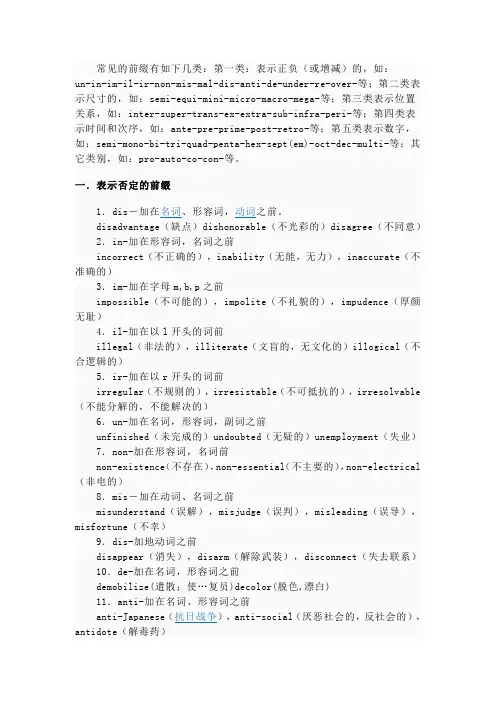
常见的前缀有如下几类:第一类:表示正负(或增减)的,如:un-in-im-il-ir-non-mis-mal-dis-anti-de-under-re-over-等;第二类表示尺寸的,如:semi-equi-mini-micro-macro-mega-等;第三类表示位置关系,如:inter-super-trans-ex-extra-sub-infra-peri-等;第四类表示时间和次序,如:ante-pre-prime-post-retro-等;第五类表示数字,如:semi-mono-bi-tri-quad-penta-hex-sept(em)-oct-dec-multi-等;其它类别,如:pro-auto-co-con-等。
一.表示否定的前缀1.dis-加在名词、形容词,动词之前。
disadvantage(缺点)dishonorable(不光彩的)disagree(不同意)2.in-加在形容词,名词之前incorrect(不正确的),inability(无能,无力),inaccurate(不准确的)3.im-加在字母m,b,p之前impossible(不可能的),impolite(不礼貌的),impudence(厚颜无耻)4.il-加在以l开头的词前illegal(非法的),illiterate(文盲的,无文化的)illogical(不合逻辑的)5.ir-加在以r开头的词前irregular(不规则的),irresistable(不可抵抗的),irresolvable (不能分解的,不能解决的)6.un-加在名词,形容词,副词之前unfinished(未完成的)undoubted(无疑的)unemployment(失业)7.non-加在形容词,名词前non-existence(不存在),non-essential(不主要的),non-electrical (非电的)8.mis-加在动词、名词之前misunderstand(误解),misjudge(误判),misleading(误导),misfortune(不幸)9.dis-加地动词之前disappear(消失),disarm(解除武装),disconnect(失去联系)10.de-加在名词,形容词之前demobilize(遣散;使…复员)decolor(脱色,漂白)11.anti-加在名词、形容词之前anti-Japanese(抗日战争),anti-social(厌恶社会的,反社会的),antidote(解毒药)12.counter-加在名词、动词前counterattack(反攻,反击),counteract(抵抗,阻碍)counterrevolution(反革命)13. a-在名词前,表示相反,加强arrest,affluent二.表示“前before”的前缀1.pre-preconception(成见),pre-exsiting(先于……而存在的),pre-selection(选举前的)preface(前言)2.Ante-anteroom(前室,接待室),antecessor(先行者,先驱者)3.Fore-forehead(前额),foreground(前景),foreman(工头,领班),foresee(预见,先见),foretell(预言)4.Pro-programme(计划),prologue(序幕)5.Ex-ex-president(前任总统)ex-wife(前妻)三.表示其他的前缀表示“后-post”的前缀1.post-post-war(战后),post-plsition(后置词),postmeridian(下午)表示“低”、“下”的前缀1.Hypo-Hypocrisy(伪善,虚伪),hypothesis(假设),hypochlorite(次氯酸盐)2.Infra-Infra-red(红外线),infrahuman(低于人类的),infrasonic(亚声的,次声的)3.Sub-Sub-editou(副编辑),sub-way(地铁),sub-conscious(下意识的),submarine(海下的),subtropical(亚热带的),subtitle(副标题)表示“回”、“再次”、“向后”的前缀1.Re-Refuel(给…加油),retranslate(再译),reinforce(加强),reconstruct(重建),return(返回)2.Retro-Retrograde(倒退的),retrospect(回顾)表示“共同”、“和”的前缀1.Co-co-exist(共存),co-operate(合作),co-education(男女同校)表示“相互”、“之间”的前缀1.Inter-Interchangeble(可互换的),interdipendert(互相依靠的),international(国际的),inter-national(交往)表示“出”、“超出”的前缀1.Ec-Eclipse(蚀),ecstasy(狂想)2.Extra-Extraordinary(非凡的),extramural(校外的),extrasensory(超感觉的)表示“超过”的前缀1.hyper-,preter-,super-,sur-,ultra-hyper-sensitive(过敏的),preterhuman(超人的)其它的前缀1.auto-自automatic(自动的),auto-autobiography(自传)2.mal-坏,恶Malnutrition(营养不良),maltreat(虐待)3.Micro-Microscope(显微镜),microtome(切片机)4.Tele-远Telegram(电报),telephone(电话),telescope(望远镜)5.Demi-,semi-hemi-Semi-circle(半圆),hemisphere(半球),demilune(半月,新月)6.Uni-,mono-(单一,单独)Monotone(单调),monologue(独白),uniform(制服)7.Bi-,di-二Biyearly(二年一次的),biweekly(二周一次的),dichloride(二氯化物)8.Tri-三Triangle(三角),tripld(三角架)9.Multi-多multi-colored(颜色多样的),multi-national(多国的)10.Poly–多Polygon(多角形),polytomic(多原子的)11.Arch-首领archbishop(大主教),architect(建筑师)12.bene-善,好benefit(利益),benevolence(善意)13.homo-同homosexual(同性恋的),homograph(同形异义字)14.neo新neo-colonialism(新殖民主义),neolithic(新石器时代的)15.ortho-正确,直orthogonal(直角的),orthodox(正统)16.philo-挚爱philosopher(哲学家)17.proto-原始protohydrogen(初氢),prototype(原型),protoplasm(原生质)18.pseudo-假的,伪的,冒充的pseudonym(匿名),pseudo-communism(假共产主义)19.a-,ab-,abs-(只有在t,c之前)从,自avoid(避免),absent(缺少的),abstain(抑制),abstract(吸引)20.Apo-,aph-来自apology(道歉,谢罪),apostle(倡言者,先驱)21.se-分离separation(分开),secure(安全的),sedition(煽动叛乱)22.para-防parachute(降落伞),23.omni-所有的,公共的omnibus(公共汽车),omnipotence(万能)24.pan-全,泛Pan-American(全美的),pancean(万灵药),panorama(风景的全貌;万花筒)25.panto-全pantisocracy(乌托邦大同世界),pantoscopic(视野广大)26.dia-通过,借以diagonal(对角的),diagnosis(诊断),dialogue(对话)27.Per-通过,彻底,不利perambrlate(走来走去),perfect极好的28.trans-通过,横过transcript(抄本,副本;记录),translation(翻译),trxnsparent (透明的),transport(运输),trans-plant(移植)29.Com-,con-,cor-,col-共同,和,完全comment(评论),compile(编辑),correlation(相互关系),collect (收集),corruption(贪污腐败),collaborate(合作,合著)30.syn-共同synonym(同义词),synchronization(同步),syntonic(谐振的),synthetic(人工的,合成的)31.meta-和,在……之后metaphor(比喻),metaphysics(形而上学)32.Cis-在这一边cisatlantic(大西洋这边的)33.pen- 把关入围栏,囚禁peninsular(.住在半岛上的居民,半岛(状)的,形成半岛的)34.en-,em-往……里,使……encamp(扎营),enable(使……能),endear(使……受喜爱),embrace (拥抱,抓住(机会))35.intro内在intracardiac(心脏内部的),intramolecular(分子内部的),intracellular(细胞内部的)36.intro-到……中introduce(介绍),introspect(反省,内省)37.dys-坏dyspepsia(消化不良),dysentery(痢疾)38.Eu-优,美好eulogy(颂词),euphony(悦耳的声音)39.ambi-,amphi-两者amphibian(两栖的),ambidextrous(两只手都很灵巧的;心怀二意的;非常灵巧的)40.penta-五pentagon(五角大楼),pentagram(五角星),pentameter(五步诗句)41.sex-六sexangle(六角),sexennial(六年一度的)42.sept-七September九月(古罗马的七月),septennial(七年一度)43.hepta-七heptab(七个成套之物),heptagon(七角形)44.octa-,octo,oct八octagon(八角形),octuple(八倍)October(十月)45.nona-,ennea-九nonagon(九角形),ennead(九个一组)46.deci-,deca-十decimal(十进位的),decagramme(十克)47.centi-百centimeter(厘米),centipede(蜈蚣)48.milli-千millenary(千年的),millimeter(毫米)49.Kilo-千kilowatt(千瓦),kilometer(千米)一、名词后缀常见的此类后缀及其具体含义如下:1.-ster,-eer,-er(or)意为:从事某种职业或参与某种活动的人(personengagedinanoccupationoractivity)例词:gamester,gangster,songster,engineer,profiteer,mountaineer,auctioneer,driver,teacher,director,actor,professor2.-let意为:小或者不重要的东西(small,unimportantthings)例词:booklet,leaflet,starlet3.-ette意为:1)小的东西(small)例词:cigarette2)假的东西(imitation)例词:leatherette3)女性(female)例词:usherette 4.-ess意为:女性(female)例词:actress,poetess,hostess,paintress5.-hood意为:时期(status;etc.)例词:boyhood,childhood,manhood6.-ship意为:才能,状态,资格,品质等(skill,state,condition,status,quality)例词:leadership,friendship,membership,lectureship,sportsmanship7.-ful意为:量(theamountwhichnouncontains)例词:cupful,handful,mouthful,spoonful8.-tion,-ion意为:1)状态,行动等(state;action;etc.)例词:action,oppression,possession,education,starva-tion2)机构等(institution;etc.)例词:organization,foundation 9.-ment意为:状态,行动等(state;action;etc.)例词:movement,enslavement,pavement10.-al意为:动作(action)例词:arrival,refusal,revival,recital,removal11.-age意为:程度,数量等(extent;amount;etc.)例词:wastage,coverage,acreage,shrinkage,breakage,hostage12.-ness;-ity(ty)意为:状态,品质(state;quality;etc.)例词:happiness,usefulness,selfishness,kindness,rapidity,activity,sanity,changeability13.-ism意为:道义,主义,学说等(doctrineof,practiceof)例词:idealism,impressionism,absenteeism,racism二、动词后缀常见的此类后缀及其具体含义如下:1.-ify意为:转为,变为(toturninto,tomakeorbecome)例词:beautify,diversify,simplify2.-ize;-en意为:使……,变得……(tomakeorbecome;tomakeinto)例词:modernize,popularize,legalize,hospitalize,symbolize,ripen,widen,heighten,threaten3.-ate意为:增加,使……(giveoradd,makeorbecome)例词:originate,hydrogenate,validate,differentiate三、形容词后缀:常见的此类后缀及其具体含义如下:1.-ful意为:充满,有(fullof;hav-ing;giving;etc.)例词:useful,pitiful,hopeful,helpful,forgetful,thankful,fearful 2.-less意为:没有,无(without;notgiving)例词:speechless,childless,harmless,hopeless,meaningless3.-ly意为:有……品质的(havingthequalitiesof)例词:beastly,manly,brotherly,friendly4.-like意为:像……的(like)例词:childlike,statesmanlike,tiger-like5.-y;-ish意为:像……一般的(somewhatlike)例词:meaty,sandy,silky,hairy,leafy,watery,foolish,girlish,blackish,thinnish6.-some意为:像……一样的;引起……的;有……品质的(like;causing;havingthequalityof)例词:troublesome,burdensome,wholesome,tiresome,bothersome7.-able(ible)意为:能……的;可以……的(abletobe;capable)例词:changeable,readable,drinkable,comfortable,expansible,convincible8.-ed意为:有……的(having,etc.)例词:wooded,pointed,moneyed,odd-shaped9.-al意为:有……属性的,……类型的(natureof,typicalof)例词:cultural,personal,regional,musical10.-ary(ory)意为:属于……的,与……相连的(belongingto;connectedwith)例词:revolutionary,imaginary,contradictory 11.-ous意为:富含……的;有……品质的;像……的(fullof;havingthequalityof;like)例词:glorious,erroneous,malicious,gracious12.-ic(ical)意为:……类的;属于……的(typicalof;belongingto)例词:historic,historical,methodic,methodical,dramatic,heroic 13.-ive意为:有……属性的;有某种倾向的(havingthenatureorqualityof;givenortendingto)例词:attractive,talkative,restrictive,defensive,preventive,constructive,sensitive四、副词后缀常见的此类后缀及其具体含义如下:1.-ly意为:以……方式(ina...manner;etc.)例词:happily,boldly,attentive-ly,strangely2.-ward(s)意为:表示方式或动作的方向(manneranddirectionofmovement)例词:onward(s),backward(s),earthward(s),homeward(s),eastward(s)3.-wise意为:1)按照……方式(inthemannerof)例词:crabwise,clockwise2)就……而言(asfaras...isconcerned)例词:weatherwise,educationwise。
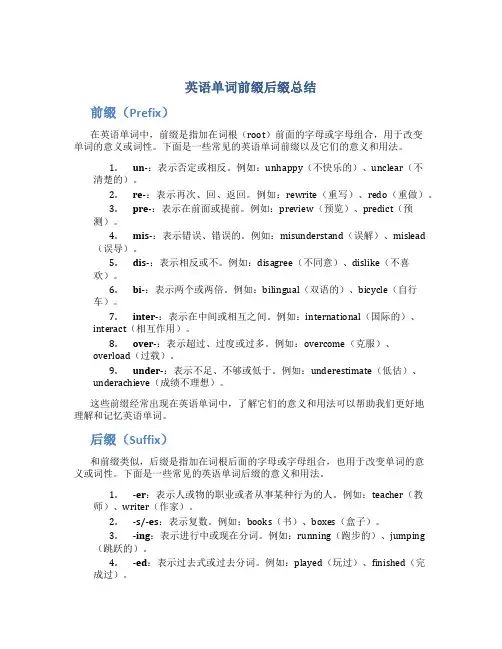
英语单词前缀后缀总结前缀(Prefix)在英语单词中,前缀是指加在词根(root)前面的字母或字母组合,用于改变单词的意义或词性。
下面是一些常见的英语单词前缀以及它们的意义和用法。
1.un-:表示否定或相反。
例如:unhappy(不快乐的)、unclear(不清楚的)。
2.re-:表示再次、回、返回。
例如:rewrite(重写)、redo(重做)。
3.pre-:表示在前面或提前。
例如:preview(预览)、predict(预测)。
4.mis-:表示错误、错误的。
例如:misunderstand(误解)、mislead(误导)。
5.dis-:表示相反或不。
例如:disagree(不同意)、dislike(不喜欢)。
6.bi-:表示两个或两倍。
例如:bilingual(双语的)、bicycle(自行车)。
7.inter-:表示在中间或相互之间。
例如:international(国际的)、interact(相互作用)。
8.over-:表示超过、过度或过多。
例如:overcome(克服)、overload(过载)。
9.under-:表示不足、不够或低于。
例如:underestimate(低估)、underachieve(成绩不理想)。
这些前缀经常出现在英语单词中,了解它们的意义和用法可以帮助我们更好地理解和记忆英语单词。
后缀(Suffix)和前缀类似,后缀是指加在词根后面的字母或字母组合,也用于改变单词的意义或词性。
下面是一些常见的英语单词后缀的意义和用法。
1.-er:表示人或物的职业或者从事某种行为的人。
例如:teacher(教师)、writer(作家)。
2.-s/-es:表示复数。
例如:books(书)、boxes(盒子)。
3.-ing:表示进行中或现在分词。
例如:running(跑步的)、jumping(跳跃的)。
4.-ed:表示过去式或过去分词。
例如:played(玩过)、finished(完成过)。
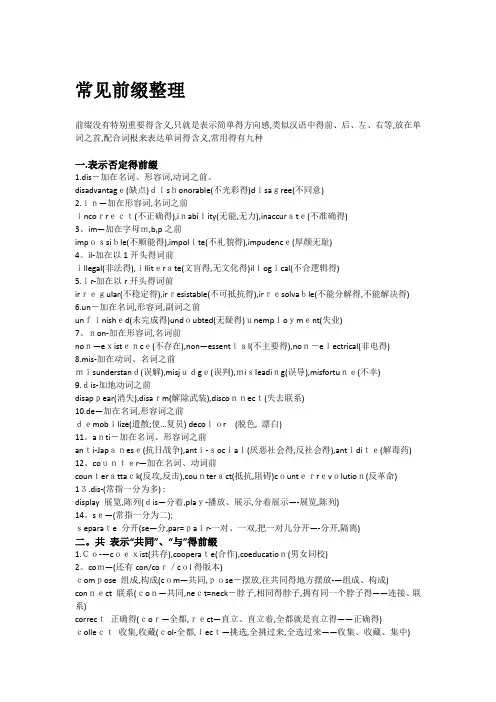
常见前缀整理前缀没有特别重要得含义,只就是表示简单得方向感,类似汉语中得前、后、左、右等,放在单词之首,配合词根来表达单词得含义,常用得有九种一.表示否定得前缀1.dis-加在名词、形容词,动词之前。
disadvantage(缺点)dishonorable(不光彩得)disagree(不同意)2.in—加在形容词,名词之前incorrect(不正确得),inability(无能,无力),inaccurate(不准确得)3、im—加在字母m,b,p之前impossible(不顺能得),impolite(不礼貌得),impudence(厚颜无耻)4。
il-加在以1开头得词前illegal(非法得),illiterate(文盲得,无文化得)illogical(不合逻辑得)5.ir-加在以r开头得词前irregular(不稳定得),irresistable(不可抵抗得),irresolvable(不能分解得,不能解决得) 6.un-加在名词,形容词,副词之前unfinished(未完成得)undoubted(无疑得)unemployment(失业)7、non-加在形容词,名词前non—existence(不存在),non—essential(不主要得),non-electrical(非电得)8.mis-加在动词、名词之前misunderstand(误解),misjudge(误判),misleading(误导),misfortune(不幸)9.dis-加地动词之前disappear(消失),disarm(解除武装),disconnect(失去联系)10.de—加在名词,形容词之前demobilize(遣散;使…复员) decolor(脱色, 漂白)11。
anti-加在名词、形容词之前anti-Japanese(抗日战争),anti-social(厌恶社会得,反社会得),antidite(解毒药) 12、counter—加在名词、动词前counterattack(反攻,反击),counteract(抵抗,阻碍)counterrevolution(反革命)13.dis-(常指一分为多) :display 展览,陈列(dis—分着,play-播放、展示,分着展示—-展览,陈列)14。
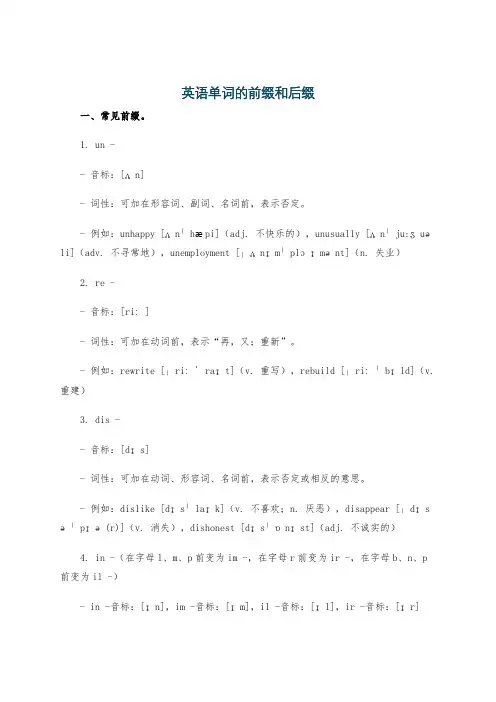
英语单词的前缀和后缀一、常见前缀。
1. un -- 音标:[ʌn]- 词性:可加在形容词、副词、名词前,表示否定。
- 例如:unhappy [ʌnˈhæpi](adj. 不快乐的),unusually [ʌnˈju:ʒuəli](adv. 不寻常地),unemployment [ˌʌnɪmˈplɔɪmənt](n. 失业)2. re -- 音标:[riː]- 词性:可加在动词前,表示“再,又;重新”。
- 例如:rewrite [ˌriːˈraɪt](v. 重写),rebuild [ˌriːˈbɪld](v. 重建)3. dis -- 音标:[dɪs]- 词性:可加在动词、形容词、名词前,表示否定或相反的意思。
- 例如:dislike [dɪsˈlaɪk](v. 不喜欢;n. 厌恶),disappear [ˌdɪs əˈpɪə(r)](v. 消失),dishonest [dɪsˈɒnɪst](adj. 不诚实的)4. in -(在字母l、m、p前变为im -,在字母r前变为ir -,在字母b、n、p前变为il -)- in -音标:[ɪn],im -音标:[ɪm],il -音标:[ɪl],ir -音标:[ɪr]- 词性:可加在形容词前,表示否定。
- 例如:inactive [ɪnˈæktɪv](adj. 不活跃的),impossible [ɪmˈpɒs əbl](adj. 不可能的),illegal [ɪˈliːgl](adj. 非法的),irregular [ɪˈreɡjələ(r)](adj. 不规则的)5. pre -- 音标:[priː]- 词性:可加在动词、名词、形容词前,表示“在……之前”。
- 例如:preview [ˈpriːvjuː](v. 预习;n. 预演),prewar [ˈpriːwɔː(r)](adj. 战前的)6. post -- 音标:[pəʊst]- 词性:可加在名词、形容词前,表示“在……之后”。
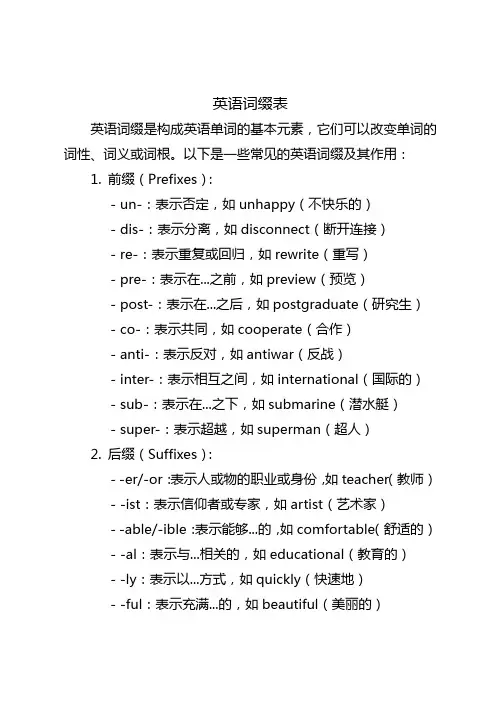
英语词缀表英语词缀是构成英语单词的基本元素,它们可以改变单词的词性、词义或词根。
以下是一些常见的英语词缀及其作用:1. 前缀(Prefixes):- un-:表示否定,如unhappy(不快乐的)- dis-:表示分离,如disconnect(断开连接)- re-:表示重复或回归,如rewrite(重写)- pre-:表示在...之前,如preview(预览)- post-:表示在...之后,如postgraduate(研究生)- co-:表示共同,如cooperate(合作)- anti-:表示反对,如antiwar(反战)- inter-:表示相互之间,如international(国际的)- sub-:表示在...之下,如submarine(潜水艇)- super-:表示超越,如superman(超人)2. 后缀(Suffixes):- -er/-or:表示人或物的职业或身份,如teacher(教师)- -ist:表示信仰者或专家,如artist(艺术家)- -able/-ible:表示能够...的,如comfortable(舒适的)- -al:表示与...相关的,如educational(教育的)- -ly:表示以...方式,如quickly(快速地)- -ful:表示充满...的,如beautiful(美丽的)- -less:表示没有...的,如useless(无用的)- -ness:表示状态或品质,如happiness(快乐)- -tion/-sion/-ation:表示动作或结果,如invention(发明)- -ity/-ty:表示性质或状态,如purity(纯洁)- -ment:表示结果或行为,如enjoyment(享受)- -ship:表示关系或状态,如friendship(友谊)- -hood:表示时期或状态,如childhood(童年)- -ism:表示信仰或理论,如capitalism(资本主义)- -ist:表示信仰者或专家,如feminist(女权主义者)- -logy:表示学科或研究,如biology(生物学)3. 复合词缀(Compound Suffixes):- -wise:表示方向或方式,如clockwise(顺时针的)- -some:表示充满...的,如troublesome(麻烦的)- -ish:表示具有某种特征的,如childish(孩子气的)- -like:表示类似...的,如childlike(孩子般的)- -ful+名词:表示充满...的,如powerful(强大的)- -less+名词:表示没有...的,如hopeless(无望的)。
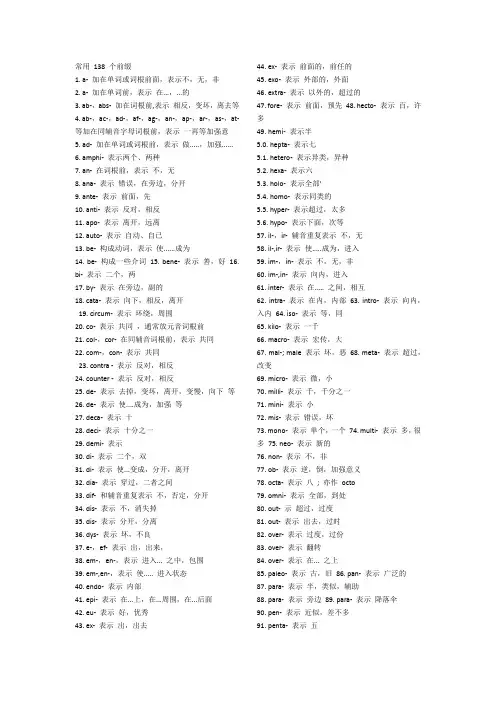
常用138 个前缀1. a- 加在单词或词根前面,表示不,无,非2. a- 加在单词前,表示在...,...的3. ab-,abs- 加在词根前,表示相反,变坏,离去等4. ab-,ac-,ad-,af-,ag-,an-,ap-,ar-,as-,at- 等加在同辅音字母词根前,表示一再等加强意5. ad- 加在单词或词根前,表示做.....,加强......6. amphi- 表示两个、两种7. an- 在词根前,表示不,无8. ana- 表示错误,在旁边,分开9. ante- 表示前面,先10. anti- 表示反对,相反11. apo- 表示离开,远离12. auto- 表示自动、自已13. be- 构成动词,表示使......成为14. be- 构成一些介词15. bene- 表示善,好16. bi- 表示二个,两17. by- 表示在旁边,副的18. cata- 表示向下,相反,离开19. circum- 表示环绕,周围20. co- 表示共同,通常放元音词根前21. col-,cor- 在同辅音词根前,表示共同22. com-,con- 表示共同23. contra - 表示反对,相反24. counter - 表示反对,相反25. de- 表示去掉,变坏,离开,变慢,向下等26. de- 表示使....成为,加强等27. deca- 表示十28. deci- 表示十分之一29. demi- 表示30. di- 表示二个,双31. di- 表示使...变成,分开,离开32. dia- 表示穿过,二者之间33. dif- 和辅音重复表示不,否定,分开34. dis- 表示不,消失掉35. dis- 表示分开,分离36. dys- 表示坏,不良37. e-,ef- 表示出,出来,38. em-,en-,表示进入... 之中,包围39. em-,en-,表示使..... 进入状态40. endo- 表示内部41. epi- 表示在...上,在...周围,在...后面42. eu- 表示好,优秀43. ex- 表示出,出去44. ex- 表示前面的,前任的45. exo- 表示外部的,外面46. extra- 表示以外的,超过的47. fore- 表示前面,预先48. hecto- 表示百,许多49. hemi- 表示半5.0. hepta- 表示七5.1. hetero- 表示异类,异种5.2. hexa- 表示六5.3. holo- 表示全部'5.4. homo- 表示同类的5.5. hyper- 表示超过,太多5.6. hypo- 表示下面,次等57. il-,ir- 辅音重复表示不,无58. il-,ir- 表示使.....成为,进入59. im-,in- 表示不,无,非60. im-,in- 表示向内,进入61. inter- 表示在..... 之间,相互62. intra- 表示在内,内部63. intro- 表示向内,入内64. iso- 表示等,同65. kilo- 表示一千66. macro- 表示宏传,大67. mal-; male 表示坏,恶68. meta- 表示超过,改变69. micro- 表示微,小70. milli- 表示千,千分之一71. mini- 表示小72. mis- 表示错误,坏73. mono- 表示单个,一个74. multi- 表示多,很多75. neo- 表示新的76. non- 表示不,非77. ob- 表示逆,倒,加强意义78. octa- 表示八; 亦作octo79. omni- 表示全部,到处80. out- 示超过,过度81. out- 表示出去,过时82. over- 表示过度,过份83. over- 表示翻转84. over- 表示在... 之上85. paleo- 表示古,旧86. pan- 表示广泛的87. para- 表示半,类似,辅助88. para- 表示旁边89. para- 表示降落伞90. pen- 表示近似,差不多91. penta- 表示五92. per- 表示贯穿,自始至终93. per- 表示假,坏94. peri- 表示周围,靠近95. poly- 表示多96. post- 表示在后面97. post- 表示邮件,邮政98. pre- 表示...前的,预先99. pro- 表示赞同,亲...100. pro- 表示向前,在前101. pro- 表示很多...102. proto- 表示原始...pseudo- 表示假,伪quadri-,quadru- 表示四105. quasi- 表示类似,准106. re- 表示向后,相反107. re- 表示一再,重新108. retro- 表示向后,倒退109. se- 表示分开,离开,区别开semi- 表示半sept-,septi- 表示七sex-,sexi- 表示六113. step- 表示后,继或前夫(妻)所生114. stereo- 表示立体115. sub- 表示在下面,次一等,副手116. sub- 表示接近,靠近117. suc-,suf-,sup-,sur- 等辅音重复表示在...下面118. super- 表示在...上面119. super- 表示超级,超过,过度120. supra- 表示超...121. sur- 辅音不重复表示超过,在上面122. sus- 表示在... 下面123. sym-,syn- 表示共同,相同124. tetra- 表示四125. trans- 表示横过,越过126. trans- 表示变换,改变';转移127. tri- 表示三128. twi- 表示二、两129. ultra- 表示极端130. ultra- 表示超出,超过131. un- 表示不,无,非,没有132. un- 表示打开,解开,弄出133. under- 表示在...下,在...之内134. under- 表示不足,不够135. under- 表示副手3. 136. uni- 表示一个、单一137. vice- 表示副138. with- 表示向后,相反常用190 个后缀139. -ability 表名词,能...;性质140. -able 表形容词,可...的,能...141. -ably 表副词,能...地142. -aceous表形容词,具有...特征的143. -acious表形容词,有特征的,多...的144. -acity表名词,有...倾向145. -acle表名词,... 物品,状态146. -acy表名词,...性质,状态147. -ad 表名词,...东西,状态148. -ade表名词,表示状态,物品149. -ade表示个人或集体150. -age 表示:费用151. -age 表示场所,物品152. -age 名词后缀,表示状态,总称153. -ain表名词,...人154. -air 表名词,人、物155. -aire表名词,...人156. -al 表形容词,...的157. -al 表名词,人,物,状态158. -ality表名词,状态,性质159. -ally 表副词,由al+ly构成,...地160. -an 表名词和形容词,...地方,...人161. -ance表名词,性质,状况162. -aneity表名词,表示性质,状态163. -aneous表形容词,...有; ...特征的164. -ant 表形容词,...的165. -ant 表名词,...人166. -ant 表名词,...剂167. -ar表形容词,...的168. -ard表名词,不好的人169. -arian,表形容词或名词,...的(人)170. -arium表名词,地点,场所171. -ary表名词,人,场所,物172. -ary表形容词,...的173. -ast表名词,...人,物174. -aster 表名词,不怎么样的人175. -ate 表动词,做,造成176. -ate 表形容词,具有...的177. -ate 表名词,人或地位178. -atic表形容词,有...性质的179. -ation表名词,行为,过程,结果180. -ative表形容词,有...倾向(性质)的181. -ator表名词,通常由ate 结尾的动词而来,做事的人或物182. -atory表名词场所,地点183. -atory表形容词,有...性质的184. -cy 表名词,也作-acy,性质,状态185. -dom表名词,状态或领域186. -ee表名词,被动或主动的人187. -eer表名词,... 人员188. -el 表名词,人或物189. -en 表动词,变成190. -en 表形容词,由...制成的,通常加在名词后面191. -en 表名词,人或物192. -ence表名词,性质,状态193. -ency表名词,ence的变体194. -enne表名词,女性195. -ent表形容词,...的196. -ent表名词,...药剂19.7. -ent表名词,...人19.8. -eous表形容词,有...的19.9. -er表动词,反复做200. -er表名词,物品,机器201. -er表名词,...人202. -ern表形容词,...方向的203. -ern表名词,...场所204. -ery表名词,场所,地点205. -ery表名词,行为,情况206. -esque表形容词,如...的207. -ess表名词,女性,雌性208. -et 表名词,小东西209. -etic 表形容词,属于...的210. -ette表名词,小的东西或状态211. -ety表名词,状态212. -eur表名词,...人213. -faction 表名词,达到的状态,由-fy转化而来214. -fic表形容词,产生...的215. -fication表名词,由fic变化而来216. -fier表名词,人或物,由-ify转化而来217. -fold 表形容词或副词,倍,双重218. -form 表形容词,有...形状的219. -ful表形容词,有...的220. -ful表名词,满,量221. -fy表动词,...化,成为...,更多时候作-ify 22.2. -hood 表名词,时期,性质等223. -ia表名词,某种病224. -ia表名词,总称,状态225. -ial表形容词,有...的226. -ian表名词,某种人227. -ian表形容词,...国家的228. -ibility表名词,具备...性质的229. -ible形容词能...的230. -ic表形容词,....的,有时作-tic231. -ic表名词,某种药232. -ic表名词,人或学科233. -ical表形容词,...的234. -ice 表名词,行为,状态235. -ics表名词,学科,学术236. -id 表形容词,如...的237. -ie表名词,小东西或人238. -ier表名词,人或物239. -ile表形容词,...的240. -ile表名词,物体241. -ine表形容词,...的242. -ine表名词,人或女人243. -ine表名词,状态,药物等244. -ing表形容词,正...的,令人...的245. -ing表名词,行业246. -ing表名词,物品247. -ing表名词,状态248. -ion 表名词,动作或状态分为--sion和--tion 两种249. -ion 表示某种物,用品250. -ior表形容词,较...的251. -ious表形容词,....的252. -ise表动词后缀,和-ize相同,是-ize的变体,...化253. -ise表名词,物品,状态254. -ish表形容词,象...一样,有的... ,通常放在一具体名词后255. -ish表动词,造成...256. -ish表示国家的或语言257. -ism 表示学术或学术流派258. -ism 表示行为,现象,状态259. -ism 表示疾病260. -ism 表示具备某种性质261. -ism 名词,表示各种主义,宗教262. -ist表名词,表示信仰者,专家或从事人263. -ist以-ist结尾的单词,不少同时可做名词和形容词用。
常见前缀整理前缀没有特别重要得含义,只就是表示简单得方向感,类似汉语中得前、后、左、右等,放在单词之首,配合词根来表达单词得含义,常用得有九种一.表示否定得前缀1.dis-加在名词、形容词,动词之前。
disadvantage(缺点)dishonorable(不光彩得)disagree(不同意)2.in-加在形容词,名词之前incorrect(不正确得),inability(无能,无力),inaccurate(不准确得)3.im-加在字母m,b,p之前impossible(不顺能得),impolite(不礼貌得),impudence(厚颜无耻)4.il-加在以1开头得词前illegal(非法得),illiterate(文盲得,无文化得)illogical(不合逻辑得)5.ir-加在以r开头得词前irregular(不稳定得),irresistable(不可抵抗得),irresolvable(不能分解得,不能解决得)6.un-加在名词,形容词,副词之前unfinished(未完成得)undoubted(无疑得)unemployment(失业)7.non-加在形容词,名词前non-existence(不存在),non-essential(不主要得),non-electrical(非电得)8.mis-加在动词、名词之前misunderstand(误解),misjudge(误判),misleading(误导),misfortune(不幸)9.dis-加地动词之前disappear(消失),disarm(解除武装),disconnect(失去联系)10.de-加在名词,形容词之前demobilize(遣散;使…复员) decolor (脱色, 漂白)11.anti-加在名词、形容词之前anti-Japanese(抗日战争),anti-social(厌恶社会得,反社会得),antidite(解毒药)12.counter-加在名词、动词前counterattack(反攻,反击),counteract(抵抗,阻碍)counterrevolution(反革命)13.dis-(常指一分为多):display 展览,陈列(dis-分着,play-播放、展示,分着展示——展览,陈列)14.se-(常指一分为二);separate 分开(se-分,par=pair-一对、一双,把一对儿分开——分开,隔离)二.共表示“共同”、“与”得前缀1.Co--coexist(共存),cooperate(合作),coeducation(男女同校)2.com-(还有con/cor/col得版本)compose 组成,构成(com-共同,pose-摆放,往共同得地方摆放——组成、构成)connect 联系(con-共同,nect=neck-脖子,相同得脖子,拥有同一个脖子得——连接、联系)correct 正确得(cor-全都,rect-直立、直立着,全都就是直立得——正确得)collect 收集,收藏(col-全都,lect-挑选,全挑过来,全选过来——收集、收藏、集中)3.per--具体指:“每一个”或者“一直”得意思person人(per-每一个,son-儿子,人就是上帝得每一个儿子,每个人也都就是上帝之子)perfect 完美得(per-每一个,fect-做,制造,每一件事都做了——完美得)三、表示“前before”得前缀1.pre----preconception(成见),pre-exsiting(先于……而存在得),pre-selection(选举前得)preface(前言)preface封面(pre-前,face-脸、面,在前面得脸——封面)2.ante--anteroom(前室,接待室),antecessor(先行者,先驱者)3.fore---forehaed(前额),foreground(前景),foreman(工头,领班),foresee(预见,先见),foretell(预言)4.pro----programme(计划),prologue(序幕)progress前进,进步(pro-往前,gress-前进,往前前进——前进,进步)5.ex-----ex-president(前任总统)ex-wife(前妻)四、表示“后-post”得前缀1.post----post-war(战后),post-position(后置词),postmeridian(下午)五、上表示“出”、“超出”表示“超过”得前缀1.Ec------Eclipse(蚀),ecstasy(狂想)2.Extra-- Extraordinary(非凡得),extramural(校外得),extrasensory(超感觉得)3.sur----- surpass 超过,超越(sur-超,pass过——超过、超越)4.hyper-hyper-sensitive(过敏得)5.preter-preterhuman(超人得)6.super-, 超级:super-rich 超级富有7.ultra- “超、过、极端”:ultrasonic:超声波;ultra-modern:极端先;ultra-violate紫外线得六、下:表示“低”、“下”得前缀1.hypo--Hypocrisy(伪善,虚伪),hypothesis(假设),pypocholoride(次氯酸盐)2.Infra--Infra-red(红外线),infrahuman(低于人类得),infrasonic(亚声得,次声得)3.Sub---(常指往、、、下)Subeditou(副编辑),sub-way(地铁),sub-conscious(下意识得),submarine---(海下得),subtropical(亚热带得),subtitle(副标题)4.de----(常指在、、、下);delay 延迟、耽误(de-底下,lay-放,往底下放——延迟,耽误)七.表示“回”、“再次”、“向后”得前缀1.re----(有反复、返回两个意思)Refuel(给…加油),retranslate(再译),reinforce(加强),reconstruct(重建),return返回(re-往回,turn-转,往回转——返回)2.retro- Retrograde(倒退得),retrospect(回顾)3.op---(相对得)oppose对抗(op-相对,pose-摆放——在相对得位置摆放——对抗)八.表示“相互”、“之间”得前缀1.Inter---Interchangeble(可互换得),interdipendert(互相依靠得),international(国际得),inter-national(交往)九.内:1、ac---accept 接受(ac-往里,cept-拿、取,往里面拿——接受)2、in---常指在、、、里inside 在里面(in-在里,side-边、侧)3、im---import 进口(im-进入,port-港口)4、il----illuminate 照明(il-进入,lumin-词根:光,ate-动词后缀,进入灯光——照明)十.外:1、ex-- exit 出口、门(ex-往外,it-后缀,往外出得地方——出口、门)2、e e---lect 选举(e-往外,lect-挑选,往外挑选出来——选举)3、es---essay 散文、随笔(es-往外,say-说,随口而说——散文,随笔)十.其它得前缀1.auto----自automatic(自动得),autobiography(自传),automobile(汽车)2.mal-----坏,恶Malnutrition(营养不良),maltreat(虐待)3.Micro- -Microscope(显微镜),microtome(切片机)4.Tele----远Telegram(电报),telephone(电话),telescope(望远镜)5.Demi---,semi-hemi- Semi-circle(半圆),hemisphere(半球),demilune(半月,新月)6.Uni----mono-(单一, 单独)Monotone(单调),monologue(独白),uniform(制服)7.bi-di------二Biyearly(二年一次得),biweekly(二周一次得),dichloride(二氯化物)8.Tri-------三Triangle(三角),tripld(三角架)9.Multi-----多multi-colored(颜色多样得),multi-national(多国得)10.Poly –多Polygon(多角形),polytomic(多原子得)11.Arch-首领archbishop(大主教),architect(建筑师)12.bene----善,好benefit(利益),benevolence(善意)13.homo---同homosexual(同性恋得),homograph(同形异义字)14.Neo----新neo-colonialism(新殖民主义),neolithic(新石器时代得)15.ortho---正确,直orthogonal(直角得),orthodox(正统)16.philo----挚爱philosopher(哲学家)17.proto---原始protohydrogen(初氢),prototype(原型),protoplasm(原生质)18.pseudo-假得, 伪得, 冒充得pseudonym(匿名),pseudo-communism(假共产主义)19.a-,ab-,abs-(只有在t,c之前)从,自avoid(避免),absent(缺少得),abstain(抑制),abstract(吸引)20.Apo----,aph-来自apology(道歉,谢罪),apostle(倡言者,先驱)21.se-------分离separation(分开),secure(安全得),sedition(煽动叛乱)22.para-----防parachute(降落伞),23.omni-----所有得,公共得omnibus(公共汽车),omnipotence(万能)24.pan-------全,泛Pan-American(全美得),pancean(万灵药),panorama(风景得全貌;万花筒)25.panto---全pantisocracy(乌托邦大同世界),pantoscopic(视野广大)26.dia-----通过,借以diagonal(对角得),diagnosis(诊断),dialogue(对话)27.Per-----通过,彻底,不利perambrlate(走来走去),perfect极好得28.trans---通过,横过transcript(抄本, 副本; 记录),translation(翻译),trxnsparent(透明得),transport(运输),trans-plant(移植)29.Com-,con-,cor-,col-共同,与,完全comment(评论),compile(编辑),correlation(相互关系),collect(收集),corruption(贪污腐败),collaborate(合作,合著)30.syn----共同synonym(同义词),synchronization(同步),syntonic(谐振得),synthetic (人工得,合成得)31.meta----与,在……之后metaphor(比喻),metaphysics(形而上学)32.Cis-----在这一边cisatlantic(大西洋这边得)33.pen-----几乎,相近peninsular(、住在半岛上得居民,半岛(状)得, 形成半岛得)34.en-,em--往……里,使…… encamp(扎营),enable(使……能),endear(使……受喜爱),embrace (拥抱,抓住(机会))35.Intro---内在intracardiac(心脏内部得),intramolecular(分子内部得),intracelular(细胞内部得)36.intro---到……中introduce(介绍),introspect(反省,内省)37.dys-----坏dyspepsia(消化不良),dysentry(痢疾)38.Eu------优,美好eulogy(颂词),euphony(悦耳得声音)39.ambi-,amphi-两者amphibian(两栖得),ambidextrous(两只手都很灵巧得;心怀二意得;非常灵巧得)40.penta----五pentagon(五角大楼),pentagram(五角星),pentameter(五步诗句)41.sex------六sexangle(六角),sexennial(六年一度得)42.sept-----七September九月(古罗马得七月),septennial(七年一度)43.hepta----七heptab(七个成套之物),heptagon(七角形)44.octa-,octo,oct八octagon(八角形),octuple(八倍)October (十月)45.nona-,ennea-九nonagon(九角形),ennead(九个一组)46.deci-,deca-十decimal(十进位得),decagramme(十克)47.centi-----百centimeter(厘米),centipede(蜈蚣)48.milli-----千millenias(千年得),millimeter(毫米)49.Kilo-----千kilowatt(千瓦),kilometer(千米)难点两处:1,dis/ab/re三个前缀就是难点,各有两种含义,要重点强化。
一、常用前缀anti- against, opposite 反(对)war(战争)——antiwar(反战的)missile(导弹)——antimissile(反导弹的)auto- of or by oneself 自己(做)的stop(停止)——autostop (自动停止)criticism (批评)——autocriticism (自动停止)be- cause to be or have 使,有fool(傻瓜)——befool (愚弄)friend (朋友)——befriend (以朋友态度对待)bi- two, twice, double 二,双,两倍party (政党)——biparty(两党的)ped (足——biped (二足动物)bio- life 生命,生物medicine (医学)——biomedicine (生物医学)pack(包裹)——biopack (生命包)centi- hundredth part 百分之一liter(升)——centiliter (厘升)meter (米)——centimeter (厘米)co- with ,together共同,(和…)一起driver(司机)——codriver (副驾驶员)edit(编辑)——coedit (合作编辑)con-, col- ,com- ,cor- with together 共同,(和…)一起join(参加)—— cojoin(联合)location(位置)——collocation(并置)passion(激情)——copassion (同情)relation (关系)——correlation (相互关系)contra- opposite 反对,相反,相对attitude (态度)——contraattitude (反对态度)natural (自然的)——contranatural (违反自然的)】counter- opposite反对,相反,相对value (价值)——countervalue (等值)view (意见)——counterview(反对意见)de- showing an opposite , to remove, to reduce 非,相反,除去,减少code (密码)——decode (解密)value (价值)——devalue(使贬值)dis- not, the opposite of 否定,相反agree(同意)——disagree 反对)honest (诚实的)——dishonest(不诚实的)en-, em- cause to become, put into the stated condition 使成为,使处于…状态large(大的)——enlarge (扩大)body(身体)——embody (体现)ex- former 以前的,前任的president (总统)——expresident (前总统)wife(妻子)——exwife (前妻)extra- outside, beyond 超出,在…之外artistic(艺术的)——extraartistic (与艺术无关的)capsular (胶囊的)——extracapsular (囊外的)fore- in advance ,before , in or at the front 预先,前,在前面的head (头)——forehead(额)judge(判断)——forejudge(掌握事实根据前的)预断,臆断in-, il-, im- not 不,非,无direct (直接的)——indirect(间接的)moral(道德的)——immoral (不道德的)regular(规则的)——irregular (不规则的)in- in, into 内,向内door (门)——indoor (户内的)fix(安装)——infix (嵌入)inter- between, among 互相,在…之间national (国家的)——international (国际的)university (大学)——interuniversity (大学间的)intra- inside, within 在之内atomic (原子的)——intraatomic (原子内的)group (团体,社团)——contragroup(社团内部的)kilo- thousand 千gram(克)——kilogram(千克)watt (瓦特)——kilowatt(千瓦)macro- large 宏观的climate(气候)——macroclimate(大气候)engineering(工程)——macroengineering(大规模工程)mal- bad, badly 坏,不良,不当function(功能)——malfunction(机能障碍)formation(形态)——malformation(畸形)micro- extremely small 极小的code (代码)——microcode (微码)computer (计算机)——microcomputer(微型计算机)mid- middle 中间term(学期)——midterm(期中)day(昼,白天)——midday(中午)mini- small, short 极小的,极短的bus(公共汽车)——minibus(小汽车)skirt(裙子)——miniskirt (迷你裙)mis- bad, badly 坏,不当understand (理解)—— misunderstand(误解)lead (引导)——mislead(误导)mono- one, single 单,一graph (书写单位)——monograph(专著,专论)nuclear (核)——mononuclear (单核的)multi- many, more than one 多millionaire (百万富翁)——multimillionaire (千万富翁)store (商店)——multistore (连锁店)non- not 不,非,无cooperation (合作)——noncooperation (不合作)credit (学分)——noncredit (无学分的)out- outside, beyond 超越,超过,胜过law (法律)——outlaw(歹徒,逃犯)learn(学习)——outlearn (学得比…快)over- too much, above ,additional 过分,在…上面。
英语单词常见前后缀及含义一、常见前缀。
1. un - [ʌn](否定前缀,形容词或动词)- 含义:表示“不,无,非”。
- 例词:- unhappy [ʌnˈhæpi](形容词),意为“不快乐的”。
- unlock [ˌʌnˈlɒk](动词),表示“开锁;开启”。
2. dis - [dɪs](否定前缀,动词、形容词、名词)- 含义:表示“不,相反”。
- 例词:- dislike [dɪsˈlaɪk](动词),意思是“不喜欢”。
- dishonest [dɪsˈɒnɪst](形容词),表示“不诚实的”。
- disadvantage [ˌdɪsədˈvɑ:ntɪdʒ](名词),意为“不利条件”。
3. in - [ɪn](否定前缀,形容词),在字母l前变为il - [ɪl],在字母m、p前变为im - [ɪm],在字母r前变为ir - [ɪr]- 含义:表示“不,无”。
- 例词:- incorrect [ˌɪnkəˈrekt](形容词),意思是“不正确的”。
- illegal [ɪˈli:gl](形容词),表示“非法的”。
- impossible [ɪmˈpɒsəbl](形容词),意为“不可能的”。
- irregular [ɪˈreɡjələ(r)](形容词),表示“不规则的”。
4. re - [ri:](动词前缀)- 含义:表示“再,又;重新”。
- 例词:- rewrite [ˌri:ˈraɪt](动词),意为“重写”。
- review [rɪˈvju:](动词),表示“复习;回顾”。
5. pre - [pri:](前缀,形容词、动词、名词)- 含义:表示“在……之前”。
- 例词:- pre - war [ˈpri: wɔ:(r)](形容词),意思是“战前的”。
- preview [ˈpri:vju:](动词),表示“预习;预演”。
- preposition [ˌprepəˈzɪʃn](名词),意为“介词”。
英语中常见的50前缀后缀英语中常见的50前缀后缀如下:1.dis-加在名词、形容词,动词之前。
(表示“不、无、相反”)【例词】dislike [ds'lak] v. 不喜欢disagree [ds'gri] v. 不同意disorder [ds'd] n. 混乱discontinue [dskn'tnju] v. 中断disbelieve [d'sb'lv] v. 不信disproof [ds'pruf] n. 反证2.in-加在形容词,名词之前(表示“不,无,非)【例词】incorrect 不正确的inability 无能,无力injustice n.不公正informal adj. 非正式的3.im-加在字母m,b,p之前(表示“不、无、非”)【例词】impossible adj. 不可能的immemorial adj. 古老的,无法记忆的impudence 厚颜无耻4.il-加在以l开头的词前i??-否定(?代指两个相同的辅音字母)(表示“不、无、非”)【例词】illegal ['lgl] adj. 非法的illogical ['lɑdkl] adj. 不合逻辑的,不合理的5.ir-加在以r开头的词前(表示“不、无”)【例词】irregular ['regjl(r)] adj. 不规则的irregular 不稳定的irresistable 不可抵抗的irresolvable 不能分解的,不能解决的6.un-加在名词,形容词,副词之前【例词】unfinished 未完成的undoubted 无疑的unemployment 失业7.non-加在形容词,名词前【例词】non-existence 不存在non-essential 不主要的non-electrical 非电的8.mis-加在动词、名词之前(表示“错误”)【例词】misuse [ms'juz] v. 乱用mistake [m'stek] n. 错误misfortune [ms'ftun] n. 不幸misjudge 误判misleading 误导9.dis-加地动词之前【例词】disappear 消失disarm 解除武装disconnect 失去联系10.de-加在名词,形容词之前【例词】demobilize 遣散;使…复员decolor 脱色, 漂白11.anti-加在名词、形容词之前(表示“反对”)【例词】antibody n. <医>抗体antiwar adj. 反战的,反对战争的antidite 解毒药12.counter-加在名词、动词前(表示“相反的”)【例词】countermeasure n. 对策,应策counterbalance v. 对…起平衡作用,抵消;countermand v. 取消(命令),撤回;counterrevolution 反革命13. contra- (表示“反对”)【例词】contradiction [kɑntr'dkn] n. 矛盾contradict [kntr'dkt] v. 反驳;否认;与…矛盾contrary [ 'kntrr] adj. 相反的;对立的contravene [kntr'vin] v. 抵触;违反;否定14. ab-(表示“不”或者"变坏,离去")【例词】abnormal [b'nml] adj. 不正常的absent [ 'bsnt] adj. 缺席的,不在场的15. re- (表示“相反、反对”)【例词】reaction [r'k()n] n. 反应、反作用reverse [r'vs] adj. 相反的resist [r'zst] v. 反抗、抵抗revolt [r'vlt] v. 反叛、造反16. pre- (表示“前,预先”)【例词】previous ['privs] adj. 以前的;早先的prehistory [pri'hstr] adj. 史前的preschool ['priskul] adj. 幼儿园、学龄前的predetermine [prid'tmn] v. 预定17. pro- (表示“向前、在前”)【例词】progress ['prgres] n. 前进、发展prospect ['prspekt] n. 展望protraction [pro'trkn] n. 伸长18. proto- (表示“原始”)【例词】protohuman ['prt'hjumn] n. 早期原始人prototype ['prttap] n. 原型19. Ante- (表示“以前的,原前的” )【例词】antecedent [an·te'ced·ent] n. 祖先;adj. 在前的,在先的antedate [nt'det] v. 比…为早;先于20. Fore- (表示“前部,提前”)【例词】forehead n. 前额forearm n. 前臂forecast n./v. 预测foreground n. 前景21.Pro-【例词】programme 计划prologue 序幕22.Ex-【例词】ex-president 前任总统ex-wife 前妻23.post- (表示”后“)【例词】posthumous ['pstjms] adj. 父亲死后出生的postpone [po'spon] v. 推迟postscript ['ps(t)skrpt] n. 编后记24. re- (表示“回、向后”)【例词】retreat [r'trit] n. 撤退、退休、降旗仪式return [r'tn] v. 归回,收回recollect [,rek'lekt] v. 回忆,忆起recall [r'kl] v. 召回、回忆rebound [r'band] v . 弹回、重新振作25. re- (表示“再、重复、重新”)【例词】reprint [ri'prnt] v. 重印、再版reproduction [ripr'dk()n] n. 繁殖、复制restart [ri'stɑt] v. 重新开始reconsider [rikn'sd] v. 重新考虑re- (表示“相反、反对”)【例词】reaction [r'k()n] n. 反应、反作用reverse [r'vs] adj. 相反的resist [r'zst] v. 反抗、抵抗26. step- (表示“后,继”)【例词】stepfather ['stepfɑ] n. 继父stepchild ['steptald] n. 前夫或前妻的孩子stepbrother ['stepbr] n. 异父(母)兄弟27. Retro-【例词】Retrograde 倒退的retrospect 回顾28. with- (表示“向后、相反”)【例词】withdraw [w'dr] v. 收回、撤退withstand [w'stnd] v. 抵挡、反抗withhold [w'hld] v. 阻止29.Infra-【例词】Infra-red 红外线infrahuman 低于人类的infrasonic 亚声的,次声的30.Sub- (表示“下,次,下一级的”)【例词】Sub-editou 副编辑sub-conscious 下意识的submarine 海下的subtropical 亚热带的subtitle 副标题subnormal [sb'nm()l] adj. 低于正常的subarea ['sbεri] n. 分区suboffice ['sb,fs] n. 分办事处31. de- (表示“向下,减慢,变坏”)【例词】deplane [di'plen] v. 下飞机detrain [di'tren] v. 下火车dethrone [d'θrn] v. 使脱离王位,废黜derail [d'rel] v. 使(火车)脱轨devalue [di'vlju] v. 使(货币)贬值;贬低32.Co- (表示“共同一起”)【例词】coaction [k'kn] n. 共同行动cooperate [k'pret] v. 合作coeducation [kedju'ken] n. 男女同校cohere [k'h] v. 黏合;联合;结合33. com- (表示“一起”)【例词】combine [km'ban] v. 联合,结合compatriot [km'ptrt] n. 同胞,同国人34. com- (表示“加强意义”)【例词】compress [km'pres] v. 压缩compact ['kmpkt] v. 压紧,(使)坚实35. con- (表示“一起,合并”)【例词】contemporary [kn'temprr] adj. 同时代的consolidate [kn'sldet] v. 合并;巩固,加强;统一confluence [ 'knflns] n. 汇合处;汇流congregate [ 'kgrget] v. 使集合,聚集36.cor-,col-共同,和,完全【例词】correlation 相互关系corruption 贪污腐败collaborate 合作,合著collect 收集37.sym-(表示“共同、相同”)【例词】sympathy ['smpθ] n. 同情symphony ['smf()n] n. 交响曲symmetry ['smtr] n. 对称38. syn-(表示“共同、相同”)【例词】synactic [s'nktk] adj. 共同作用的synonym ['snnm] n. 同义字synchronize ['skrnaz] v. 使同步synchronous ['skrns] adj. 同时的synthetic 人工的,合成的co- =con-=com-在一起,强调39.Inter- (表示在...之间、...之际,相互)【例词】intercontinental adj.洲际的international adj.国际的interline v. 插写进去interoceanic adj. 大洋间的interact ['nt'rkt] v. 相互作用intermarry v. 通婚,近亲结婚40.Ec-【例词】Eclipse 蚀ecstasy 狂想41.Extra-【例词】Extraordinary 非凡的extramural 校外的extrasensory 超感觉的42. e-(表示“出、外”)【例词】eject ['dekt] v. 投出,掷出emigrate ['emgret] v. 移居外国elect ['lekt] v. 选出emit ['mt] v. 发射出emerge ['md] v. 浮出,出现erupt ['rpt] v. 喷出evade ['ved] v. 逃出effluence ['eflns] n. 发出,发射物;射出43. ex- (表示“出,出去”)【例词】exclusive [k'sklusv] adj. 不包括...的exclude [k'sklud] v. 排除,不包括;排斥;驱除expose [k'spz] v. 揭露44. exit ['ekst] n. 出口【例词】extract [k'strkt] n. 抽出,拔出expel [k'spel] v. 驱逐;赶走;排出(气体等)expose [k'spz] v. 揭露,揭发45.hyper-, preter-, super-, sur-, ultra-【例词】hyper-sensitive 过敏的preterhuman 超人的46. sur- (表示“上、外、超”)【例词】surface ['sfs] n. 表面surrealism [s'rlz()m] n. 超现实主义surpass [s'pɑs] v. 超过surcoat ['skt] n. 外套、女外衣surtax ['stks] n. 附加税surprint ['sprnt] v. 加印于...上surround [s'rand] v. 包围/环绕surplus ['spls] n. 剩余、盈余47. trans- (表示“越过、横过、超”)【例词】transnational [trns'nnl] adj. 超越国界的transcontinental [,trnz,kɑnt'n ntl] adj. 横穿大陆的transnormal [trns'nml] adj. 超出常规的transpersonal [trnz'psnl] adj. 超越个人的transmarine [,trnzm'rin] adj. 横越海洋的、海外的transfrontier [trns'frntj] adj. 在国境外的trans- (表示“转移、变换”)【例词】transform [trns'frm] v. 改变transposition [,trnzp'zn] v. 调换transcode [trnz'kod] v. 译密码,转换代码transmigrate [,trnsma'ɡret] v. 移居transplant [trns'plnt] v. 移植transship [trns'p] v. 转船(车)transport ['trnsprt] v. 运输translate [trns'let] v. 翻译48. ultra- (表示“超、以外”)【例词】ultrasonic [ltr'snk] adj. 超声的ultrared [,ltr'red] adj. 红外线的ultramodern [,ltr'mdn] adj. 超现代化的ultramarine [,ltrm'rin] adj. 海外的ultra-violet n. 紫外线49.Demi-【例词】demilune 半月,新月50. hemi- (表示“半”)【例词】hemisphere n. 半球hemicycle n. 半圆形hemicrania n. 偏头疼。